

Rated Published: 19 Jul 2023 For business For consumers
How Ethical Is PrettyLittleThing? Words: Isobella Wolfe Category:
Our editors curate highly rated brands that are first assessed by our rigorous ratings system. Buying through our links may earn us a commission— supporting the work we do. Learn more
It may be pretty on the surface, but things get a little murky as you go down the supply chain. PrettyLittleThing is “Not Good Enough” due to its lack of positive action for people, the planet, and animals. This article is based on the PrettyLittleThing rating published in October 2022 and may not reflect claims the brand has made since then. Our ratings analysts are constantly rerating the thousands of brands you can check on our directory.
Not so pretty underneath
On the surface, Boohoo-owned PrettyLittleThing appears—well, pretty. Its Instagram account, boasting over 18m followers, is full of diverse, happylooking women sporting colourful and trendy clothes. The brand, founded in the UK in 2012 as a small accessories-only company, has since grown to one of the largest fast fashion retailers. It is a go-to option for size inclusivity, featuring extensive plus, tall, and petite ranges. But we know by now that rapid production at low prices is a classically unsustainable business model, so let’s dig a little deeper and see if the “pretty” continues below the surface for workers, animals, and the environment. How ethical is PrettyLittleThing?
Celebrity collab backlash
Share for change FB TW
In July 2023, fashion model Naomi Campbell faced backlash from fans over her collaboration announcement with PrettyLittleThing. With a history of modelling for high fashion labels from Prada to Yves Saint Laurent and Burberry, the public was “shocked and disappointed” over her decision to work with the fast fashion brand to design a new collection. PLT is one of many fast fashion brands that rely on celebrity and influencer collabs to boost their image, a clever marketing tactic that “encourages micro-trends and allows brands to reach consumers at all times of the day, wherever they are,” explains Amy Reid for Varsity. In a world facing an impending climate crisis, the folks consumers look up to should be discouraging overconsumption and promoting a slower pace in fashion and beyond, but that is sadly still far from the reality in most cases.
Environmental impact
Off the bat, PrettyLittleThing’s environment rating is “Not Good Enough”. It doesn’t use lower-impact materials materials, instead opting for planetdamaging polyester in most of its lineup. There is no evidence it has taken meaningful action to reduce or eliminate hazardous chemicals, nor does it implement any water or waste reduction initiatives. While it has set a science-based target to reduce greenhouse gas emissions generated from its own operations and supply chain, there is no evidence it is on track to meet its target. PrettyLittleThing also follows the take-make-waste model of fast fashion brands, selling hundreds of styles that end up in landfill after just a few wears. There is a long way to go before this brand could be considered good for the planet.
Labour conditions
For a brand promoting such happy people in its advertising, scoring such a
low labour rating of “Not Good Enough” is an even bigger disappointment for PrettyLittleThing. Little of its supply chain is certified by labour standards which ensure worker health and safety or other labour rights, and it received a score of 21-30% in the Fashion Transparency Index, which is slightly up on its last score but still lagging behind many. There is no evidence it implements practices to encourage diversity and inclusion in its direct operations or supply chain, nor did it disclose adequate policies or safeguards to protect suppliers and workers in its supply chain from the impacts of COVID-19 at the height of the pandemic. Worst of all, PLT does not appear to pay a living wage. While PLT ambassadors may seem happy, the same can’t be said for workers in the supply chain.
Animal welfare
In a not-so-shocking turn of events, PrettyLittleThing is also rated “Not Good Enough” for our animal friends. While it doesn’t use fur, angora, or exotic animal skin or hair, it does use leather, wool, and down without stating sources. There is no evidence it has a policy to minimise the suffering of animals, nor that it traces any animal products to the first stage of production, so there is no way to guarantee the welfare of any animals along the supply chain.
Overall rating: Not Good Enough
So, how ethical is PrettyLittleThing? Based on our own research, we gave PrettyLittleThing our second-lowest overall rating of “Not Good Enough”. While this is a slight improvement on its previous “We Avoid” rating, it’s still a fast fashion brand worth avoiding. The brand has to turn its act around for people, the planet, and animals before any part of its behind-the-scenes can be considered “pretty”. By being more transparent about its practices
and making crucial improvements to everything from worker wages to materials, PLT could see its score increase.
Note that Good On You ratings consider hundreds of issues, and it is not possible to list every relevant issue in a summary of the brand’s performance. For more information, see our How We Rate page and our FAQs.
See the rating.
We know that size inclusivity is one of the most significant barriers for people trying to shop more responsibly, and there is no shame in shopping for brands that are making a start if they best suit your needs. Fortunately, there are tons of size-inclusive alternatives to PrettyLittleThing out there to help you slow your consumption down and invest in quality pieces that will stand the test of time. Here are a few of our faves.
Good swaps
“Good” and “Great” alternatives to PrettyLittleThing Girlfriend Collective
Rated: Good
Girlfriend Collective creates minimal, luxury clothes made with fair labour, certified by the Social Accountability Standard International SA8000. The brand uses lower-impact materials like recycled polyester as well as lowerimpact, non-toxic dyes and is fully OEKO-TEX® STANDARD 100 certified.
Inclusively sized Girlfriend Collective offers products from 2XS-6XL.
See the rating
Shop Girlfriend Collective @ LVRSustainable.
Shop Girlfriend Collective.
CHNGE
Rated: Good
CHNGE is a US-based more sustainable fashion brand using 100% organic material, built to last a lifetime while making a statement.
Find CHNGE's inclusive clothes in sizes 2XS-4XL.
See the rating.
Shop CHNGE
Afends
Rated: Good
Born in Byron Bay, Australia, Afends is a responsible brand leading the way in hemp fashion. Drawing inspiration from the environment, streetwear, and surf culture, Afends’ mission is to create more sustainable clothing through innovation, action, and positive change. As true hemp advocates, they purchased 100 acres of farmland called Sleepy Hollow to grow their own hemp crops and ignite the hemp revolution.
Find most of the range in sizes XS-XL.
See the rating.
Shop Afends
Outland Denim
Rated: Great
Outland Denim makes premium denim jeans and clothes, and offers employment opportunities for women rescued from human trafficking in Cambodia. This Australian brand was founded as an avenue for the training and employment of women who have experienced sex trafficking.
Find most of the brand's range in US sizes 22-34.
See the rating.
Shop Outland Denim.
Sotela
Rated: Good
US-based Sotela is a body inclusive, responsible clothing company offering adaptable pieces with the flexibility of 1-2 sizes in each.
See the rating
Shop Sotela.
Editor's note
My Notes:
Page 2
lack of positive action for people, the planet, and animals.
October 2022
Article on
classically unsustainable business model
Page 3
modelling for high fashion labels from Prada to Yves Saint Laurent and rely on celebrity and influencer collabs to boost their image
“encourages micro-trends and allows brands to reach consumers at all times of the day, wherever they are,”
the folks consumers look up to should be discouraging overconsumption
‘It’ girls need to be used to market a more eco-friendly way of shopping.
slower pace
doesn’t use lower-impact materials
planet- damaging polyester
hazardous chemicals
waste
greenhouse gas emissions
no evidence it is on track to meet its target.
Pretty Little Thing needs to be more transparent about its operations and sustainability progresses.
take-make-waste
selling hundreds of styles that end up in landfill after just a few wears.
If the collaboration is going to be limited edition/exclusive, then the longevity of the products is essential so that they can follow the resale nature of the
sneaker market.
Page 4
Little of its supply chain is certified by labour standards
21-30% in the Fashion Transparency Index, evidence it implements practices to encourage diversity and inclusion
This is only done ‘above the surface’, with models/influencers.
PLT does not appear to pay a living wage.
it does use leather, wool, and down without stating sources. no evidence no way to guarantee the welfare of any animals along the supply chain.
Ahluwalia consciously works with the interest of animals in mind and frequently uses animal prints in her designs, which acknowledge their beauty. The welfare of animals NEED to be addressed and actioned within the collaboration.
PrettyLittleThing our second-lowest overall rating of “Not Good Enough”.
Page 5 making crucial improvements to everything from worker wages to materials, PLT could see its score increase.
Page 6
lower-impact materials like recycled polyester as well as lower- impact, non-toxic dyes and is fully OEKO-TEX® STANDARD 100 certified.
Page 7
100% organic material, built to last a lifetime while making a statement.
Consider these materials for the t-shirt - further research here.
Page 8
hemp
Hemp could be a consideration for the T-shirt material.
ignite the hemp revolution
Page 9
flexibility of 1-2 sizes in each
If the T-shirt is designed to be an oversized fit, not only will it be more desirable to alternate body shapes, but it will also decrease the number of sizes that need to be made - ultimately decreases the necessary level of production.









You are in: / Home (/) / PrettyLittleThing.com Ltd
PrettyLittleThing.com Ltd
Share this:
Pretty Little Thing is renowned for its fast fashion, epitomised in its sale of dresses on Black Friday for 8p.
Owned by Boohoo Group (/company-profile/boohoo-group-plc), the Pretty Little Thing brand is a mainstay in the UK’s fast fashion scene.
Here we outline the main criticisms of the company.
How ethical is Pretty Little Thing?
Our research highlights several ethical issues with Pretty Little Thing, and it received a worst Ethical Consumer rating for Environmental Reporting, Climate Change, Pollution & Toxics, Palm Oil Sourcing, Animal Testing, Animal Rights, Workers’ Rights, Supply Chain Management and Tax Conduct.
Below we outline some of these issues. To see the full detailed stories, and Pretty Little Thing’s overall ethical rating, please sign in or subscribe (/subscriptions)
People
Pretty Little Thing was marked down in the Human Rights category because its parent company Boohoo Group (/company-profile/boohoo-group-plc) was found to be selling clothes made by Pakistani workers who earned 29p per hour, according to a December 2020 article in The Guardian.
It was also marked down for the Leicester garment factories scandal. An independent investigation published in September 2020 by Alison Levitt QC stated
“Boohoo’s monitoring of its Leicester supply chain has been inadequate for many years.”
The investigation was carried out a!er claims that workers were paid below minimum wage (as low as £3.50 per hour). The investigation said “allegations of unacceptable working conditions and underpayment of workers are not only well-founded, but are substantially true."
Many large clothes companies list the countries where suppliers are located, due to how sourcing from oppressive regimes and supply chain workers’ rights abuses are common in the clothing sector. As neither Boohoo nor Pretty Little Thing disclosed the country of origin of its suppliers, it lost half a mark under Ethical Consumer’s Human Rights category.
It scored our worst rating for Supply Chain Management. It didn’t appear to audit any of its suppliers outside of the UK, wasn’t part of any multi-stakeholder initiatives (/fashionclothing/shopping-guide/high-street-clothes-shops), and despite appointing Sir Brian Leveson to

Ethical Consumer Best Buy: No

Boycotts: No
(/) Explore ethical ratings of 40,000+ brands and products Search Subscribe (/subscriptions) Sign in
Energy Fashion & Clothing Food & Drink Health & Beauty Home & Garden Money Retailers Technology
(/)
Company profiles FAQs (/node/modal/75304)
“
provide independent oversight of its ‘Agenda for change’ it was unclear in what ways this change was supposed to be happening.
Its parent company, Boohoo Group, also had no policy against sourcing cotton (/fashionclothing/choosing-most-sustainable-fabric) from Uzbekistan and Turkmenistan, even though it is widely known that these are two of the world’s largest exporters of cotton and each year governments forcibly (/fashion-clothing/brands-criticised-removing-forced-labour-statementswake-chinas-boycott) mobilise over one million citizens to grow and harvest cotton.
Boohoo scored just 11% in the 2019 Fashion Transparency Index, which ranks 200 of the biggest global fashion brands and retailers according to their disclosure surrounding their supply chain and social and environmental impact. The average score was 21%.
Animals
Pretty Little Thing lost a whole mark under Ethical Consumer’s Animal Rights category. Within the Boohoo group, items containing leather, wool and down were either found as for sale or were discussed in company policy as materials. It stated that by 2025 “All our leather, wool, feather and down will be sourced in line with industry best practice”, suggesting that for the time being it wasn’t following best practice - and this seemed to be the case, as no further detail was found.
Ethical Consumer also found that Boohoo and Pretty Little Thing lacked any clear policies related to animal testing, despite selling several cosmetic products.
Environment
Pretty Little Thing scores our worst rating for Carbon Management and Reporting, because its parent company Boohoo didn’t appear to have taken adequate steps to address its emissions.
The only steps it discussed were LED rollouts and installing solar panels in Burnley and Manchester.
Nothing was mentioned of its supply chain, which is where most of its emissions would be, nor of transport or other key issues within the clothing sector. While it had a carbon reductions target in line with international agreements, it provided no information about how it planned to meet these targets.
It also scored a worst rating for Environmental Reporting, because it provided virtually no detail about environmental issues caused by company activity and its e"orts to address them, and it didn’t have any meaningful future dated environmental reduction targets.
It scored our worst rating for its toxic policies related to clothing. Boohoo stated in its Sustainability Plan 2021 that it was launching a 'clothes.made smarter' scheme, saying "We've analysed our material mix and developed guidelines for more sustainable materials, with a big focus on polyester and cotton which are the materials we use the most across the group." But little detail about what this meant was detailed, and no information about whether it sourced sustainable cotton was identified.
It also scored a worst pollution and toxics rating for cosmetics, because it appeared to have no policies prohibiting the use of parabens, triclosan or phthalates.
Politics
Pretty Little Thing lost a whole mark under Ethical Consumer’s for Likely Use of Tax Avoidance Strategies category. This is because its parent company Boohoo Group (/companyprofile/boohoo-group-plc) is incorporated in Jersey, a jurisdiction considered to be a tax haven (/ethical-consumers-list-tax-havens), despite the majority of its operations being on the UK mainland.
Four of Boohoo’s directors were paid over £1m for the year ended February 2021, which was considered to be excessive.
Want to find out more? Subscribe (/subscriptions) to see the full detailed stories about Pretty Little Thing.
My Notes:
Page 1
dresses on Black Friday for 8p.
received a worst Ethical Consumer rating for Environmental Reporting, Climate Change, Pollution & Toxics, Palm Oil Sourcing, Animal Testing, Animal Rights, Workers’ Rights, Supply Chain Management and Tax Conduct.
found to be selling clothes made by Pakistani workers who earned 29p per hour
Leicester garment factories scandal.
“Boohoo’s monitoring of its Leicester supply chain has been inadequate for many years.”
Parent company of Pretty Little Thing.
£3.50 per hour
“allegations of unacceptable working conditions and underpayment of workers are not only well-founded, but are substantially true."
Page 2
‘Agenda for change’ it was unclear in what ways this change was supposed to be happening.
Lack of commitment towards their sustainable claims.
Boohoo Group, also had no policy against sourcing cotton (/fashionclothing/choosing-most-sustainable-fabric) from Uzbekistan and Turkmenistan
items containing leather, wool and down were either found as for sale or were discussed in company policy as materials
It stated that by 2025 “All our leather, wool, feather and down will be sourced in line with industry best practice”
This suggests that this is currently the case and there is no available action plan to imply what changes they are going to make.
Pretty Little Thing lacked any clear policies related to animal testing,
despite selling several cosmetic products.
worst rating for Carbon Management and Reporting, didn’t appear to have taken adequate steps to address its emission
While it had a carbon reductions target in line with international agreements, it provided no information about how it planned to meet these targets.
provided virtually no detail about environmental issues caused by company activity and its e"orts to address them
"We've analysed our material mix and developed guidelines for more sustainable materials, with a big focus on polyester and cotton which are the materials we use the most across the group."
This hasn’t been followed up or proven.
worst pollution and toxics rating for cosmetics, because it appeared to have no policies prohibiting the use of parabens, triclosan or phthalates.
Rose Celestin Former Contributor
I cover insights for CFOs building resilient supply chains. FORBES LEADERSHIP CFO NETWORK
0
Jul 10, 2023, 07:41pm EDT

BIRMINGHAM, ENGLAND - MARCH 23: Danielle May (L) and a guest attend the launch of the SHEIN pop-up ... [+] GETTY IMAGES FOR SHEIN
EDITORS' PICK
Shein And PrettyLittleThing Face Fast Fashion Backlash. Here’s How To Build Trust Through ESG
Fashion trends come and go. As apparel companies have learned to accelerate the fashion cycle while driving down costs to reduce prices, consumers have had an increased interest in what fashion brands are doing to be more sustainable with their supply chain operations.
Why Are Fast Fashion Retailers Facing Backlash?
With the fashion industry being the second largest consumer of water and accounting for approximately 2-8% of global carbon emissions, fast fashion retailers like Shein and PrettyLittleThing (PLT) have come under heavy scrutiny due to concerns of unsustainable business practices.
The general consensus is that fast fashion is extremely harmful to both humans and the environment. As a result, fast fashion retailers have lost trust with many consumers over time. This is why a recent Shein influencer trip sparked backlash over the company purportedly exploiting marginalized influencers to push propaganda. Likewise, Naomi Campbell was criticized for her recent collaboration with PLT — a Boohoo-owned company, also accused of unsustainable business practices.
According to a BCG study, fashion companies are heavily relying on digitization to predict demand head on to quickly rollout high fashion trends at affordable prices. But with such agility comes to question social and environmental impact.
Shein
Shein is on target to achieve $60 billion revenue by 2025 boosted
by founder Chris Xu’s marketing brain power, the company’s ability to hedge import taxes and near-shoring its manufacturing capabilities in close proximity to China.
Best Travel Insurance Companies
By Amy Danise Editor
Best Covid-19 Travel Insurance Plans
By Amy Danise Editor
Supply Chain Ethics

According to the company’s 2022 Sustainability and Social Impact Report, the fast fashion retailer is reportedly making progress towards enhancing sustainability throughout its end-to-end product lifecycle by sourcing responsible products and materials, decarbonizing its supply chain and protecting biodiversity and animal welfare, among other key priorities under its ESG roadmap. Yet, its track record for human rights violations has yielded unwavering controversy among many socially-conscious consumers that has left a perpetual stain on the fashion brand, as evidenced by recent backlash from a recent influencer trip.
FROM FORBES ADVISOR
MORE
CEO: C-suite news, analysis, and advice for top decision makers right to your inbox.
Get the latest news on special offers, product updates and content suggestions from Forbes and its affiliates.
Email address Sign Up
By signing up, you agree to our Terms of Service, and you acknowledge our Privacy Statement. Forbes is protected by reCAPTCHA, and the Google Privacy Policy and Terms of Service apply.
While the company is committed to investing $15 million to improve labor conditions after admitting that two of its factories were found to be in violation of Chinese labor laws, journalists, activists and trade groups have been incessant in their pursuit to uncover more damnatory evidence of ongoing human rights violations in an effort to enforce greater accountability on the retailer.
In reference to labor and management relations and occupational health and safety, Shein has adopted a multitude of code of ethics policies in which every Shein employee must undergo training and agree to adhere to such policies while employed with the company. In 2022, the company reported that it held 52 training sessions with 3,206 staff members from offices in Shenzhen, Nanjing and Guangzhou.
Supply Chain Sustainability
The company also disclosed that it has leveraged technology and its flexible supply chain to enable forecasting accuracy to meet demand all while minimizing excess inventory waste. But by leveraging this technique to produce items on-demand, it has in
turn emitted an absolute 9.17 million tCO2e to the environment in 2022. The company stated that it is at the beginning stages of implementing decarbonization programs to address its 9.15 million tCO2e Scope 3 emissions due to its production volume increasing to 57% in 2022. On the other hand, it emitted 3,781 tCO2e in Scope 1 and 19,505 tCO2e in Scope 2 emissions in 2022.
Because more than 99% of its emissions are Scope 3, this is an area of opportunity for the company to implement and enforce better supply chain policies to manage its Tier 2+ suppliers more effectively. So far, Shein has entered a new partnership with Apparel Impact Institute (AII) and Brookfield Renewable Partners to promote renewable energy use and efficiency. Through this partnership, the brand will be investing $7.6 million in AII programs to begin aligning its supplier network with its decarbonization program targets.
PrettyLittleThing
Boohoo Group PLC (parent company to PLT) reported USD $2.2 billion (1.77 billion GBP) revenue across its brand portfolio in FY2023. Targeted reinvestment of supply chain savings from its tightly managed inventory that has been declining 36% YoY, an optimized freight strategy, and nearshoring have led to enhanced supply chain lead times and free cash flow.
Supply Chain Ethics
With 18 million active customers, the global fashion e-commerce group has reportedly made progress on its overall sustainability strategy across its brand portfolio while also acknowledging that it is aware that inappropriate, unethical, or illegal practices can go
undetected which could lead to investigations from regulatory bodies and may cause reputational damage.
Its approaches to mitigating reputational risks associated with supply chain ethics have been to:
Implement responsible purchasing practices that are incorporated into brand buying practices
Enforce modern slavery, anti-bribery and ethical compliance training programs and plans across the group
Engage Bureau Veritas as a third-party audit partner
Manage non-compliance correction processes through a UK ethical compliance team.
Supply Chain Sustainability
The group also disclosed an 8% reduction in its market-based carbon footprint from 852,370 tCO2e to 781,146 tCO2e since the previous reporting year, driven by its transition from air freight to road or sea freight and a reduction in fabric purchased.
On the other hand, its operational location-based Scope 1 and Scope 2 emissions have increased from 4,161 to 5,150 tCO2e as a result of a 71% increase in gas consumption across existing and new properties and a 32% increase in electricity consumption. Its total absolute market-based and location-based emissions amounted to 1.57 million tCO2e in 2022, emitting 1,095 tCO2e in Scope 1 and 4,353 tCO2e in Scope 2 emissions across its UK and offshore companies.
With Scope 3 also accounting for 99% of its emissions, the Boohoo
Group will be working with its suppliers who produce 50% of its volume to complete a Higg Index Facility Environment Module (FEM) with a minimum of 10% verification.
By 2030, it plans to achieve carbon reductions across its value chain aligned with science-based targets equivalent to a 52% reduction in emissions relative to its growth, according to the group’s climate report. The company’s full ESG Progress Report is also included in its Annual Report & Accounts 2023.
How To Build Trust Through ESG
A company looking to build out an ESG initiative, especially when reputational damage has already occurred, must realize that this is an enduring endeavor that requires intentional top-down leadership to drive success in building consumer trust, strictly adhering to regulatory laws, enforcing responsible sourcing activities, and reducing carbon footprint through robust carbon accounting mechanisms.
1. Sustainability is important—so what to do about it?
Develop an ESG roadmap that encompasses between three to five strategic imperatives. Then, clearly define your supply chain and sustainability standards as well as measures your company will take to ensure that your suppliers and your supplier’s suppliers are being held accountable to these standards.
2. Supply chain complexity can be an issue.
Strategic suppliers typically have high profit impact and high supply risk. They will also usually have long-term contracts and high visibility with executive leadership. For these reasons,
determine who your strategic partners are through supply base segmentation and consolidate as necessary to reduce complexity. It is also beneficial to identify alternative suppliers to create redundancy in your supply chain. Additionally, nearshore or reshore manufacturing capabilities among your strategic supply base where feasible to boost scale, speed, and manufacturing efficiency.
Next, create a baseline category summary encompassing each supplier’s annual spend profile, price evolution over the past three years, applicable 3rd party regulation requirements, and risk profile.
Then, work with your strategic supply base to fully document their supply chain standards and train them on mutually agreed upon expectations to ensure alignment with your company’s supply chain and sustainability standards on a semi-annual or annual basis. Some key expectations can include maximizing material and energy efficiency to reduce waste from material and energy usage across factories or shifting to a 100% renewable energy model. When misalignment has been identified, it is necessary to place the supplier on a corrective action plan with a target date for when they are expected to be in compliance with established supply chain and sustainability standards.
3. Supply chain visibility is needed to map out nthtier suppliers.
As seen above, more than 95% of carbon emissions reported by retailers come from Scope 3 emissions, which are CO2 emissions that are not directly controlled by the company, but rather, can occur in upstream or downstream activities of an organization.
Clear visibility into Tier 2, 3, and 4+ suppliers is needed to drive a successful sustainability initiative in order to hold your supplier’s suppliers accountable to supply chain and sustainability standards as well.
Therefore, leverage digitization tools to enhance end-to-end supply chain visibility. For example, a digital twin enables a company to identify where flow and capacity constraints can occur in the supply chain by creating a digital replica of a physical asset or process. It can also be used to map out nth-tier suppliers through real-time monitoring. Additionally, other technologies like IoT, AI, and ML can help establish and measure sustainability targets within an entire supply chain network while also predicting new demand based on changing business requirements.
Aside from mapping out nth-tier suppliers and tracking energy consumption and optimization metrics, these technologies can also be used to ensure employee safety. Some use cases include floor condensation detection to mitigate slip and fall hazards, PPE validation, and no-motion detection to help ensure lone worker safety.
In fact, many fast-fashion retailers are already using enhanced digital capabilities like AI to enable intelligent push, fast-fashion pull, and on-demand digital DTC tactics. With a new targeted focus on sustainability, fashion retailers can utilize technology to also reshape the fast fashion narrative to ensure sustainability and build consumer trust.
4. Consumers want to trust retailers to make and source products the right way.
Be transparent and stay abreast of new global regulations. Regularly publish sustainability results to shareholders and downstream customers, informing them of sustainability practices and progress made against baseline metrics.
However, a common pitfall to avoid is greenwashing. In 2021, a European Commission report found that 42% of companies participated in greenwashing tactics. With a new EU antigreenwashing legislation made into effect Jan. 1, European companies will now be required to provide verifiable information on CO2 emissions related to “products or services, from the initial manufacture, through to the removal of the product or its eventual transformation through recycling”. For companies operating outside of the EU, a voluntary eco-label that states how the garment was produced and certifies by a third-party that it was produced in a sustainable manner can help counter greenwashing suspicions.
Another pitfall is gaslighting. As seen with the Shein influencer trip debacle, consumers felt that they were being shown a staged facility, misrepresenting actual working conditions of its factories. While leveraging marketing tactics can help increase brand value, data driven insights into supply chain and sustainability standards will help to boost the integrity of a company’s ESG program. This can be achieved by creating a comprehensive ESG operational dashboard and source of truth to automate ESG data and calculations to drive Scope 3 accuracy and track meaningful metrics related to labor practices, occupational health and safety, and code of ethics trainings to communicate to downstream customers.
Can Fast Fashion Be Sustainable?
Ensuring supply chain ethics and sustainability is a concerted effort that takes intentionality to reshape the fast fashion narrative. Companies must be flexible to respond to supply chain issues that could yield unsustainable and unethical results while also finding ways to increase supply chain circularity. By establishing an ESG roadmap, leveraging innovation to navigate supply chain complexity, increasing end-to-end supply chain visibility to ensure accountability throughout the entire supply chain, and informing consumers through transparent and reliable data, fast fashion retailers can help shift the fast fashion paradigm to build and keep consumer trust.
Follow me on LinkedIn. Check out my website.

Rose Celestin
Rose Celestin is an award-winning thought leader in procurement and supply chain management. She writes about supply chain... Read More ADVERTISEMENT Editorial Standards Print Reprints & Permissions
My Notes:
Jul 10, 2023
Page 1
Page 2
Naomi Campbell was criticized for her recent collaboration with PLT
Page 5
18 million active customers
Page 6
8% reduction in its market-based carbon footprint fr
Improvements have been made since 2022 round ups.
transition from air freight to road or sea freight and a reduction in fabric purchased.
71% increase in gas consumption across existing and new properties and a 32% increase in electricity consumption.
Page 7
By 2030, it plans to achieve carbon reductions across its value chain aligned with science-based targets equivalent to a 52% reduction in emissions relative to its growth, according to the group’s climate report.
Develop an ESG roadmap that encompasses between three to five strategic imperatives
Consider creating a mock up ESG roadmap for the brand as a result of the collaboration with Ahluwalia.
Page 10
transparent and stay abreast of new global regulations.
informing them of sustainability practices and progress made against baseline metrics.
a common pitfall to avoid is greenwashing
European Commission report found that 42% of companies participated in greenwashing tactics.
Page 11
Ensuring supply chain ethics and sustainability is a concerted effort that takes intentionality to reshape the fast fashion narrative.
This needs to be acknowledged within my rescue package. increase supply chain circularity.
By establishing an ESG roadmap, leveraging innovation to navigate supply chain complexity, increasing end-to-end supply chain visibility to ensure accountability throughout the entire supply chain, and informing consumers through transparent and reliable data, fast fashion retailers can help shift the fast fashion paradigm to build and keep consumer trust.

How ethical and sustainable is Pretty Little Thing as a fashion brand?
The Good Shopping Guide gives Pretty Little Thing, an
to table Ethical performance in category 0 100 Pretty Little Thing Parent company: Boohoo Group Plc Category: Fashion Retailers: Ethical Comparison 37 GSG score 68 GSG category benchmark Ethical brand ratings and accreditation since 2001 Ethical brand ratings and accreditation since 2001 Explore Ethical Ratings For Consumers For Businesses About Us
Back
online fast fashion brand owned by Boohoo Group PLC, a low Ethical Rating. Unfortunately, this brand receives a Good Shopping Guide Ethical Score in our Ethical Fashion Retailers Ratings Table and has not yet met our minimum Ethical Benchmark. This brand has several areas to improve upon before it would likely qualify for our Ethical Accreditation
In what areas does Pretty Little Thing perform poorly?
Pretty Little Thing scored poorly for the Environment, Animals, and People, partly because it is a fast fashion company and commits all kinds of ethical infractions.
Although several Boohoo Group brands (including Burton, Pretty Little Thing, and Dorothy Perkins) declare that solely organic cotton is
Ethical Rating
Environment
Environmental Report
Organic
Nuclear Power
Better Cotton Initiative
Fossil Fuels
Animal
Animal Welfare
People
Armaments
Code of Conduct
used in the production of their products, this claim is unsupported by any independent certification or verification. Cotton is certified to make sure that it wasn’t grown in a way that would have harmed nearby farmers, ecosystems, wildlife, or communities because it is a crop that typically employs high levels of pesticides. Pretty Little Thing thus obtained a very low score for our Organic criteria.
Boohoo, the parent business has also come under fire from PETA for using wool in several of its goods. In response to these criticisms, Boohoo announced to the media that it would stop selling wool products in its online stores. This story also shows that Boohoo terminated this agreement in response to protests from
Political Donations
Ethical Trading Schemes
Human Rights
Human Rights+
Other
Ethical Accreditation
Other Criticisms
Other Criticisms+
= GSG Top Rating
= GSG Middle Rating
= GSG Bottom Rating
About our ratings
sheep producers. Given that some of Pretty Little Thing’s products still occasionally include wool, vegans may wish to steer clear.
From there, Pretty Little Thing’s record with regard to violating animal welfare standards doesn’t get any better; parent firm Boohoo came under fire for passing off real fur, possibly from a rabbit, as artificial fur. This includes deceiving customers and murdering animals solely for sake of profit and fashion. This is just one more reason why those who are vegetarians, vegans, or who care about animal welfare may want to steer clear of this business until it adopts higher standards and begins pursuing our Ethical Accreditation! Because of these occurrences, we did not award Pretty Little Thing
a high rating for its Animal Welfare Policy.
Only £3.50 per hour was paid to (UK) garment workers who worked solely for the Boohoo Group, according to a 2020 research by Labour Behind the Label. This was much less than the £8.72 minimum wage in the UK at the time. The business is also accused of operating factories in Leicester while the UK was closed, exposing workers to Covid-19, and publicly threatening workers who were more vulnerable.
The COVID Fashion Report, a revision of Baptist World Aid Australia’s Ethical Fashion Report, was released in 2020 and discusses yet another infringement of human rights. The study’s approach is based on the six COVID Fashion Commitments, which demand that
companies show what they are doing to help and safeguard their most vulnerable supply chain members. Pretty Little Thing did not demonstrate compliance with any of the COVID Fashion Commitments through its actions.
According to research by the Environmental Audit Committee, Boohoo Group’s subsidiaries are among the UK’s least environmentally friendly clothing brands (EAC). The EAC required documentation of the steps 16 British stores are doing to lessen the environmental effect of the items they sell in a letter it delivered in November 2018. The audit also showed that neither of the previously mentioned two businesses had ratified the Action, Collaboration, and Transformation labour
rights agreement, which aims to ensure that all garment workers are paid enough to support themselves.
In what areas does Pretty Little Thing perform well?
Though the aims of the Pretty Little Thing Annual Report 2020 are ambiguous, Pretty Little Thing’s 2021 Sustainability Plan does improve somewhat by including a few objectives; these goals focus on packaging reduction and reducing operational carbon emissions by an average of 4.2% every year. However, with the Net Zero 2050 deadline, Pretty Little Thing will have to stick closely to that reduction percentage if they are to meet this global target
Pretty Little Thing also has a complete and
comprehensive Code of Conduct; with such paperwork, both investors and customers can hold businesses accountable and determine which companies are making plans for a sustainable future. Here is the Pretty Little Thing Code of Conduct
How can the Pretty Little Thing brand improve its Ethical Rating?
In relation to Pretty Little Thing, The Good Shopping Guide’s score is given based on 15 ethical standards.
Pretty Little Thing must address a number of issues before the company can receive our Ethical Accreditation, including its lax standards for animal welfare and treatment of workers in its supply chain.
If your fashion brand values
ethics and sustainability, why not check out The Good Shopping Guide’s Ethical
Accreditation? Increase customer and investor confidence and stand out from the greenwash.
Accredited Brands
How We Rate
Free Initial Ethical & Sustainability Assessment

Get in Touch
Terms & Conditions Copyright © 2024. All rights reserved.
My Notes:
low Ethical Rating
Page 2
several areas to improve upon before it would likely qualify for our Ethical Accreditation.
scored poorly for the Environment, Animals, and People
Page 3
unsupported by any independent certification or verification
Any sustainable material claims that I make within my collaboration need to show a certification mock up alongside - encourage transparency.
Pretty Little Thing thus obtained a very low score for our Organic criteria.
Page 4
parent firm Boohoo came under fire for passing off real fur, possibly from a rabbit, as artificial fur
deceiving customers and murdering animals solely for sake of profit and fashion
Page 5
£3.50
Minimum in the UK at this time was £8.72.
The business is also accused of operating factories in Leicester while the UK was closed, exposing workers to Covid-19, and publicly threatening workers who were more vulnerable.
Page 6
. Pretty Little Thing did not demonstrate compliance with any of the COVID Fashion Commitments through its actions.
According to research by the Environmental Audit Committee, Boohoo Group’s subsidiaries are among the UK’s least environmentally friendly clothing brands (EAC).
packaging reduction and reducing operational carbon emissions by an average of 4.2% every year.
Page 7



Why Anti-Fast Fashion Activists Protested the PrettyLittleThing Fashion Show
 BY SOPHIE HIRSH
BY SOPHIE HIRSH
JUL. 18 2023, UPDATED 4:37 P.M. ET

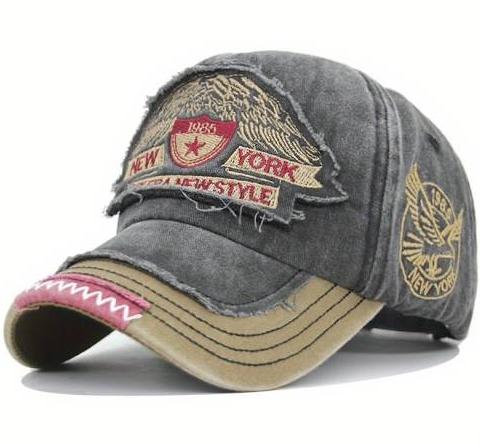





We are currently living through the age of fast fashion, where numerous brands pump out new styles on the daily, typically made using environmentally-destructive manufacturing practices, by laborers who are often underpaid, lack proper protection, and are mistreated. With this information becoming more and more exposed, fans of popular fast fashion brand PrettyLittleThing may be wondering, is Pretty Little Thing ethical?





Home > Small Changes > Style > Sustainable Fashion
Advertisement Price Drop Alert Temu Advertisement
Sign in SMALL CHANGES BIG IMPACT CLIMATE ACTION GO GREEN
SOURCE: GETTY IMAGES
In 2022, a group of fair fashion advocates protested the fast fashion brand outside of its fashion show, demanding that Pretty Little Thing (stylized as PrettyLittleThing) make some serious changes in the realm of ethics and sustainability. Keep reading to learn more about PrettyLittleThing, its ethics, and the protest.










PrettyLittleThing is a fast fashion brand owned by boohoo group.
PrettyLittleThing is a major U.K.-based, fast
Price Drop Alert Temu Advertisement
SOURCE: GETTY IMAGES
fashion, mostly-online retailer that ships to countries around the world. One of 13 brands owned by boohoo group, PrettyLittleThing sells clothing, shoes, accessories, beauty products, and even some home goods, geared at teenage girls and women. Molly-Mae Hague, a former Love Island contestant, joined the brand as creative director in 2021. She stepped down from the job in June 2023.
Is PrettyLittleThing ethical or sustainable?
The blog Good On You , which rates fashion brands based on sustainability, labor treatment, and animal welfare, has PrettyLittleThing scored with a "Not Good Enough" as its overall rating, as of July 2023. This is a step up from Good On You's previous rating of PrettyLittleThing, which was "We Avoid" the blog's lowest rating.
That was due to: the lack of evidence that PrettyLittleThing has done anything significant to reduce its environmental impact, a lack of transparency about its factories or workers, and for the brand using leather, wool, and down without sharing any information about the supply chain.
And in 2020, boohoo group was the subject of a slavery investigation by TheSundayTimes , in which an undercover reporter got a job at the factory, and was paid less than half of Britain’s minimum hourly wage.









Price Drop Alert Temu Advertisement Advertisement
Based on those two things alone, no, PrettyLittleThing is not guided by ethics or sustainability. But what does the brand have to say for itself?

SOURCE: GETTY IMAGES
PrettyLittleThing claims to be going greener.
PrettyLittleThing is actually known for selling “The £5 Dress” (about $6.52 USD, as of July 2023), which the brand claims to make using fabric that would otherwise go to waste, in a supposed effort to make products accessible and affordable “to everyone.” That said, PrettyLittleThing could be much more effective in reducing waste if it worked to design patterns that produced less waste in the first place.
Not to mention, The £5 Dress is still made in the same sweatshops as PrettyLittleThings other garments, about which boohoo group provides no information, despite the parent company making a 2021 pledge to do so for all of its brands by the end of 2021.
That pledge was made as part of boohoo
Advertisement
group’s sustainability plan, which is known as UP.FRONT. The plan details three areas that boohoo group is supposedly focusing on: making clothes “smarter” and more sustainably; doing more for its suppliers and being more transparent about its supply chain; and running the business more responsibly, as well as being more responsible and tackling climate change.
The UP.FRONT document mostly focuses vague goals that boohoo group aims to accomplish between 2021 and 2025, such as: being less wasteful in clothing production, using less packaging, reducing carbon emissions by 52 percent, improving conditions for U.K. garment factories; and sharing a transparent factory list with customers.
And on PrettyLittleThing's website, there are a few portions that seem to cater to ecoconscious customers. There is a PrettyLittleThing sustainable line, which features garments made "using materials that are more sustainably sourced," such as recycled polyester. There are also a few PLT blog posts about sustainable living, and a link to the reGAIN app, which allows customers to send old clothes in to be recycled, in exchange for discounts off PrettyLittleThing purchases.
However, none of these things are doing much to actually reduce PLT's environmental footprint one might say it's greenwashing
Advertisement Advertisement
So while boohoo group and PrettyLittleThing claim to be hard at work on becoming a better company in terms of sustainability, transparency, and worker rights, it appears as though PrettyLittleThing is just as unethical as most other fast fashion companies.
A protest called out unethical labor conditions at PrettyLittleThing.
On Feb. 16, 2022, the PrettyLittleThing X MollyMae fashion went up at The Londoner Hotel in London’s Leicester Square. Right outside, fair fashion campaigner and influencer Venetia La Manna and the group Oh So Ethical led a protest of the fast fashion brand.
As La Manna detailed in an Instagram post about the protest, PrettyLittleThing has “built Advertisement
their brand off exploitation,” and “harmfully imply that clothing is disposable.” She also called the brand out for using sweatshops and violating labor rights.
“There is nothing sustainable about thousands of new items added to their site each and every week. We staged the demo to demand that they pay their garment makers fair living wages, recognise their unions and commit to a drastic reduction in output,” La Manna wrote on Instagram. “The social and environmental issues of fashion are far reaching, and last night’s runway show presented a good opportunity to shine a light on some of them.”
Advertisement
At the protest, La Manna and the other leaders encouraged people to stop supporting PrettyLittleThing and other boohoo group brands (which include Nasty Gal and Karen Millen). We have many guides to shopping sustainably on Green Matters — our No. 1 tip is to shop secondhand; we also recommend supporting sustainable, small fashion labels when you can.
Thisarticle,originallypublishedonFeb.18,2022, hasbeenupdated.
More from Green Matters
Stopping Fast Fashion: How Consumers Can Break the Addiction to Cheap Clothes
These Black-Owned Clothing Brands Are All About Sustainable, Secondhand, and Ethical Fashion
Celebrities Who Started Sustainable Slow Fashion Brands Advertisement
My Notes:
JUL. 18 2023
Page 1
Page 2
In 2022, a group of fair fashion advocates protested the fast fashion brand outside of its fashion show, serious changes in the realm of ethics and sustainability.
This is ESSENTIAL !
Page 3
Molly-Mae Hague, a former Love Island contestant, joined the brand as creative director in 2021. She stepped down from the job in June 2023.
Was this due to the birth of her daughter Bambi, or was it due to her disagreement of the brand’s procedures?
PrettyLittleThing has done anything significant to reduce its environmental impact, a lack of transparency about its factories or workers, and for the brand using leather, wool, and down without sharing any information about the supply chain.
Page 4
make using fabric that would otherwise go to waste, in a supposed effort to make products accessible and affordable “to everyone.
Justification for selling a £5 dress.
Page 5
doing more for its suppliers and being more transparent about its supply chain; more responsible and tackling climate change.
2021 and 2025, such as: being less wasteful in clothing production, using less packaging, reducing carbon emissions by 52 percent, improving conditions for U.K. garment factories; and sharing a transparent factory list with customers.
Use the collaboration to acknowledge how their goals can be achieved.
reGAIN app, which allows customers to send old clothes in to be recycled, in exchange for discounts off PrettyLittleThing purchases.
Research more on the actual sustainability benefits of the app - How it works? Is this just greenwashing to fool consumers into thinking that they are sustainable? Page 6
PrettyLittleThing has “built
Page 7
their brand off exploitation,”
Follow on note from page 6.
“There is nothing sustainable about thousands of new items added to their site each and every week. We staged the demo to demand that they pay their garment makers fair living wages, recognise their unions and commit to a drastic reduction in output,” Page 8
shop secondhand;
Pretty Little Thing products can encourage second hand shopping if they are limited my released with an exclusive/desirable appeal.

No downloads; free base game
It's all the buzz. An anime-lover's hit game without downloads.

via Instagram (@prettylittlething)
Pre-Loved Tat: PrettyLittleThing has solved sustainability!
FASHION - NEWS
A secondhand marketplace will not paper over the cracks of a corrosive

G123
SHARE
business model
30th August 2022
Text Daniel Rodgers
The letters PLT, which previously referred to the fast fashion juggernaut famed for alleged-worker exploitation and planetary destruction, will henceforth stand for Pre-Loved Tat. This morning, Molly-Mae Hague and her team announced that the company has launched a secondhand marketplace where users can hawk their old clothes for a bit of extra cash. “It will be an app where girls can resell their PLT pieces and pretty much anything pre-loved,” Hague said. “It is a massive move for us and something that we think will disrupt the fashion industry, as people aren’t going to expect this from us.”
READ MORE


A Vivienne Westwood exhibition and auction is coming to London Jacquemus is a daddy in every sense of the word

Coachella
2024: See the best dressed acts from both weekends


Immokantoorvergelijker.be
Wilt u uw woning verkopen?
Vraag een gratis schatting voor uw woning aan op Immokantoorvergelijker.be
Alien encounters and first dates: Vinnie Hacker on HUGO goes Off The Rails
She’s not wrong! The brand, which has enraged climate activists by promoting a culture of disposable fashion –staging 100 per cent sales and the like – has proven itself antithetical to sustainable shopping. “Our mission is focused on the 3 R’s of re-selling, re-wearing, and recyling,” the description of the app, which is only available in
Learn more
the UK, reads. “Through this, our aim is to make fashion more diverse, inclusive, and less wasteful.” That’s all well and good, but when a PLT garment can barely make it through a wash without getting trashed, what is the actual point? Unless extreme changes are made to PLT’s business model – which is built on cheap labour and a mammoth turnover of product – these behemoths will never be able to offer an ethical alternative.
Over a two week period last May, the Royal Society for Arts, Manufactures and Commerce pulled various items from ASOS, Missguided, PrettyLittleThing, and Boohoo, with analysis suggesting that 49 per cent of garments had been made from virgin plastics like nylon, acrylic, and polyester –which are themselves forged from fossil fuels. Though PLT might position a marketplace as the solution to throwaway fashion, it’s worth noting that charity shops are already overloaded with its corrosive products. So even if initiatives like this might encourage young people to thrift their fashion, paying lip service to sustainability will not paper over the fissures the company has already created. The best thing PLT could do would be to shutter its business entirely – the only solution to fast fashion is the abolition of fast fashion.
We reached out to PrettyLittleThing for comment, and this is what a brand representative had to say: “Our customers told us they want simple and easy ways to give their old clothes a new lease of life and make some money for themselves in the process. PrettyLittleThing Marketplace is a community platform that will allow people to do just that. We are all about making fashion more diverse and inclusive, giving our customers the creative freedom to express themselves. With the PLT Marketplace App, it is now even easier to join our ‘PLTLoved’ movement as we all play our part in reducing waste.”


 Original audio
View profile
Original audio
View profile
My Notes:
Page 2
30th August 2022 Text Daniel Rodgers
Pre-Loved Tat.
New meaning of PLT??
company has launched a secondhand marketplace where users can hawk their old clothes for a bit of extra cash. “It will be an app where girls can resell their PLT pieces and pretty much anything pre-loved,”
Page 3
PLT garment can barely make it through a wash without getting trashed
Quality and longevity of materials needs to be actioned.
49 per cent of garments had been made from virgin plastics like nylon, acrylic, and polyester – which are themselves forged from fossil fuels
charity shops are already overloaded with its corrosive products.
When the products are eventually disposed of they cannot be decomposedcausing detrimental effects on our environment.
Everything Wrong With Pretty Little Thing
THURSDAY 30 APRIL 2020
This site uses cookies from Google to deliver its services and to analyse traffic. Your IP address and user agent are HOME ABOUT WORK WITH ME SUBSCRIBE WHO MADE
A SUSTAINABLE LIVING BLOG BY IZZY MCLEOD The Quirky Environmentalist

One of the posts on my site with the highest page views is a review I did about 8 years ago from the brand Pretty Little Thing,(prettylittlething.com) it ranks quite high on google and
This site uses cookies from Google to deliver its services and to analyse traffic. Your IP address and user agent are metrics, to ensure quality of service, generate usage statistics and to detect and address abuse.
gets a steady flow of clicks each month. It also really clashes with my blog style and ethics now and I've been ignoring it for a while. I did think about just deleting it. But instead I thought it would be better to put a disclaimer at the top and bottom of this post stating that pretty little thing is not ethical and sustainable and giving people a place to read more about the brand, so that perhaps I can encourage people to learn more about the company before considering buying.
If I can get a few people of the 50 a week that click on it to maybe think about looking into sustainable and ethical fashion, or even just questioning who is making their clothes and whats in them, that's a win. Sothispageisaresourceastowhyyouprobablyshouldn't buyfromPLTifyoucareabouttheenvironmentorpeople.
Now I've targeted PLT because I have a post about them, but a lot of what I say here could be applied to pretty much any fast fashion brand out there, I'm talking fashion nova, Missguided, Shein, wish, they could all be doing more for both people and the environment.
Wrong With Pretty Little Thing| The Quirky Environmentalist
Lack of Transparency Everything
So I had a look on Pretty Little Thing's website and could see nothing on there that was obvious about their supply chains, nothing about where their clothes were made, whether their workers were treated well or paid well. Even Misguided has pages about their corporate responsibility and how they're trying to change their supply chain (whether I believe them is another matter, but it's a start).
But I'm not gunna just skim, so I checked all their FAQs and random pages in the hope of finding something about their supply chain, even just one measly line about how they're "committed to ending modern day slavery" or something else that looks good but doesn't mean anything and I could not find anything!
This is a real bad sign, without transparency we have no idea what goes on in PLT's supply chains. The people working in these supply chains could be working in modern day slavery, they could be exploited, underpaid, there could be children working in these factories. We just don't know, because there's absolutely nothing about it on their site.
On the Fashion Revolution Transparency index they scored a whole 9%, which I think speaks for itself. They also get the worst scores in almost every category from Ethical Consumer. In 2015 it was found they were paying workers in the UK less than minimum wage, so I dread to think what they're doing abroad. Do better Pretty Little Thing. Who Makes your clothes? Verdict:EvenfromyouIexpectedbetter.
See also: Why do we need a Fashion Revolution?
"Sustainability"
I was surprised to see PLT has two sustainable initiatives in place, so let's discuss just how sustainable they are. RaGAINApp
I love the premise of this app, to encourage more people to donate clothes rather than them going straight into landfill! Amazing! However I'm skeptical as usual, first of all the reward for donating clothes is money off brand new clothes from their site which gives the impression of "get rid of clothes just to buy more" which is not a very sustainable mindset.
Secondly I don't see much on ReGAIN's website about where these clothes actually go, they say they're recycled and donated to charity shops but where? Who is recycling them? Into what? Where do they go when they don't get sold? Are they just ending up in landfill somewhere like Ghana after being dumped in a second hand market there? They say they're "closing the loop" on fashion but I really need more information to fully believed that.
Verdict:Goodinprinciple,needsmoreinformation.
Recycled Collection
Like many other big brands PLT have bought out their own "sustainable" collection recently with their recycled clothing. Again do I think this is a good thing in principle? Heck yeah. But the key is again in the details.
First of all, almost all of these clothes have polyester in them, even the ones that are cotton. Now there's a debate about whether polyester belongs in clothes even when recycled but basically it ends up in the sea as microfibres when washed, and humans are now eating/drinking a credit card's worth of plastic a week. I'd have less of an issue with them having some recycled polyester if even their cotton pieces weren't 50% plastic but hey ho.
Secondly, these pieces are still about £12 for a dress . You're seriously trying to tell me these are made sustainably and ethically for £12?! Not possible. And while they may be made of recycled materials are they still going to 8 different countries whilst being manufactured like many other clothes are? Is the whole manufacturing process more sustainable for these pieces? Where is the material recycled from? So many questions.
Third, this is a tiny percentage of their clothing. This one small collection, even if it was completely sustainably and ethically made, wouldn't make up for the rest of the clothes they produce each day. I looked on their "New In Today" tab when first writing this and there were 52 items on there, after a week they had 622 items in that week. That's an average of 96 pieces per day, during a pandemic. This level of consumption is just not sustainable, and is especially awful in the middle of a global pandemic.
Pretty Little Thing you say people can do their "little bit" by shopping your recycled range, well you sure are doing very little. This is honestly below the bare minimum of what they should be doing sustainability wise, and it really looks like these initiatives are there to score green brownie points.
Verdict:Awholelotofgreenwashinghere.
Response to COVID-19
Back in late March there were calls to Pretty Little thing to close their Tinsley warehouse after workers were saying they felt unsafe at work. This is not a unique case, workers from ASOS and Amazon have made headlines saying they feel unsafe in warehouses working at the moment.
PLT do have a section on their website about how those at risk are furloughed or working from home will still be being paid and don't have to work and that their warehouse workers are staying 2m apart. But they should all be at home, if my workplace that sells food shut down to protect its workers then a fashion warehouse definitely should. And with workers still in the factory saying they felt unsafe, it's a bad sign.
Fashion is not an essential at the moment and so putting workers at risk for the sake of selling more clothes and making more money isnotaresponsibleapproachtothe currentpandemic.
Instead of furloughing workers and looking after supply chains they have a "Stay Home" section to sell loungewear to people who are stuck at home... making money off the pandemic! Yay! They're still uploading almost 100 items a day to their site. PLT is owned by
a family of billionaires, they could more than afford to close down for a bit to protect staff and also take a long hard look at the way they run things but no... profit is more important right?
Verdict:Profitoversavinglives,lovelystuff.

Blackfishing
Much more recently Pretty Little Thing came under fire on twitter for hiring a Swedish model for their site who has a history of blackfishing. I won't name the model because I don't want to give her attention.
If you're not sure what blackfishing is it's basically when white women try to look generally trying to mixed race or like a light skinned black woman by appropriating the features, hair, and skin colour of Black women without actually experiencing the racism, discrimination and general lived experience of Black women. White women do this to get clout, and often (like in this case with this PLT model) take jobs and opportunities that should be going to Black women. A double slap in the face for these Black women. This video explains it well.
The story about this particular model's blackfishing isn't small, it comes up front and
centre when you search for her. PLT either didn't do their research or knew about it and chose to ignore it while hiring her, she's also modelled for sites like Fashion Nova (another notorious fast fashion site).
PLTdobetter,andhireactualBlackwomenforjobslikethisratherthanwhitewomen appropriatingBlackfeatures.
A lot of people were responding to the image on twitter like "This girl is white?" which I think shows the issue.
Verdict:Don'thiremodelsappropriatingfeaturesofotherraces.
And that, it pretty much that. I hope you learned something today and began to question where PLT are making their clothes. If you want to help change the future of fashion then feel free to email, tweet, write to PLT and ask them who is making their clothes, how their clothes are made, why they're still currently operating business as usual and why they're hiring white women parading as black women instead of actual black women. Just a thought if you wanted something to do.
I may do this on other brands, I enjoyed making this post and video so if you have any brands you'd like to learn more about then let me know!
LABELS: FASHION , PRETTY LITTLE THING , PRETTYLITTLETHING.COM
SHARE: +
MORE READS
My Notes:
THURSDAY 30 APRIL 2020
Page 1
Page 3
Lack of Transparency
Page 4
nothing on there that was obvious about their supply chains, Supply chains need to be made available within the sub brand.
"committed to ending modern day slavery"
Vague and doesn’t explain HOW
without transparency we have no idea what goes on in PLT's supply chains.
Who Makes your clothes?
“Who made this T-shirt ?” - this could be a tag or note that comes with each item involved in the Ahluwalia collaboration.
Page 5
reward for donating clothes is money off brand new clothes from their site which gives the impression of "get rid of clothes just to buy more" which is not a very sustainable mindset.
Continue to encourage further consumption - this won’t slow down the cycle.
where these clothes actually go, they say they're recycled and donated to charity shops but where? Who is recycling them? Into what? Where do they go when they don't get sold? Are they just ending up in landfill somewhere like Ghana after being dumped in a second hand market there?
all of these clothes have polyester in them,
How can this be an effective recycled collection?
pieces are still about £12 for a dress . You're seriously trying to tell me these are made sustainably and ethically for £12?! Not possible.
Is the whole manufacturing process more sustainable for these pieces? Where is the material recycled from?
Page 6
96 pieces per day,
New products added to the website each day !!!
PrettyLittleThing Marketplace app: Greenwashing or a step forward?
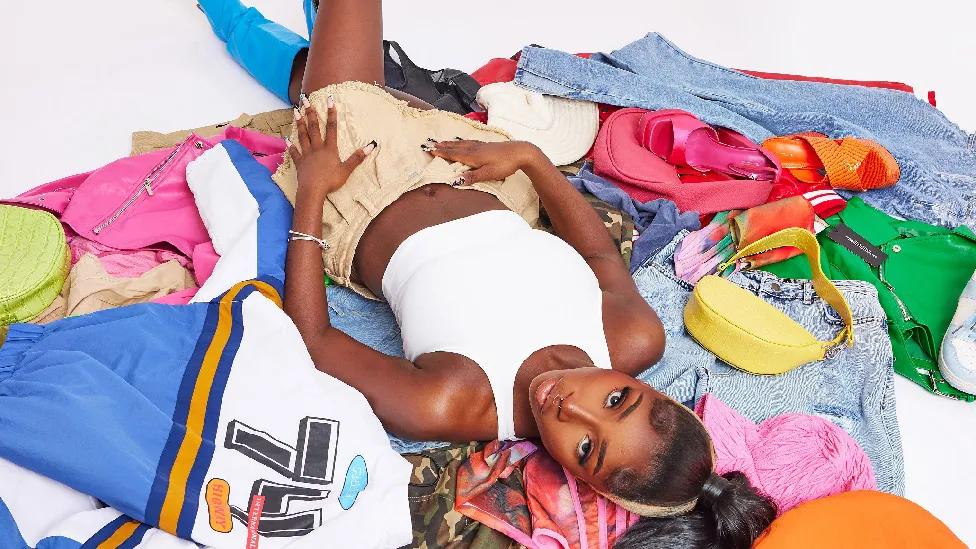
Let us know you agree to cookies
 By Bonnie McLaren
reporter
By Bonnie McLaren
reporter
In what appears to be a move away from fast fashion, PrettyLittleThing have launched an app which will allow customers to re-sell their old clothes.
Earlier this week, the fashion giant announced Indiyah Polack - one of this year's Love Island finalists - as the first PLT Marketplace ambassador.
The 23-year-old will be selling some of her own outfits on the site, and in a statement said the app's focus on re-wearing and re-selling was "something that's important to [her]".
Some have seen it as a positive move from the brand, which might encourage more young people to shop second hand.
But there has been a backlash, and many have accused PLT of "greenwashing"
Top Stories Features
LIVE Rwanda bill returns to Commons as Lords continue standoff
Huw Edwards leaves BBC on medical advice
5 hours ago
Parliamentary researcher charged with spying for China
4 hours ago
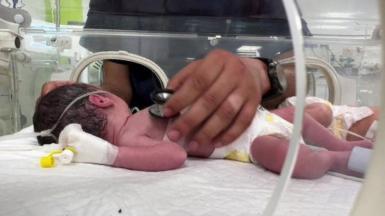
Gaza baby saved from dead mother's womb

'I only run in the park and don't go out at night'
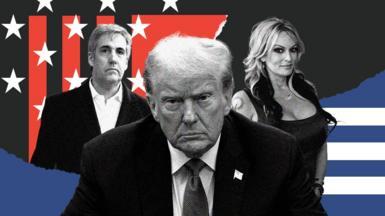 Love Island star Indiyah Polack is the face of PrettyLittleThing's new marketplace
Newsbeat
Love Island star Indiyah Polack is the face of PrettyLittleThing's new marketplace
Newsbeat
Israel-Gaza war Cost of Living War in Ukraine India Election Climate UK World Business Politics More Newsbeat
Home
2 September 2022 PRETTYLITTLETHING
Sign in Home News Sport Weather iPlayer Sounds Bitesize Search BBC
We use cookies to give you the best online experience. Please let us know if you agree to all of these cookies.
- marketing designed to make customers believe your company is doing more to protect the environment than it really is.
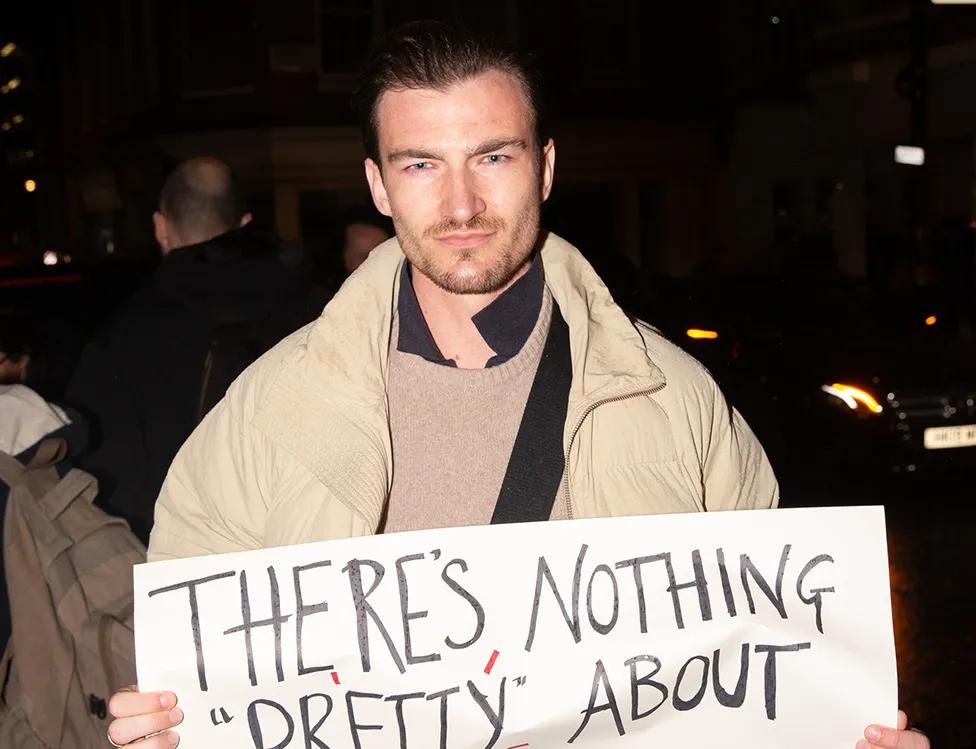
Brett Staniland, who was on Love Island last year, agrees.
Even before his time on the show, the 28-year-old model has taken a stance against fast fashion. While on the series, he refused to wear clothes from the show's then sponsor, I Saw It First.
Last year, he protested outside a PrettyLittleThing catwalk show put on by the brand's creative director and fellow former Islander Molly-Mae Hague.
Brett tells Radio 1 Newsbeat that he thinks PLT are putting the onus on consumers to be more environmentally friendly.
"When I saw the announcement, it was a massive eye roll," he says.
"It was interesting for me to see PLT announcing that this is how they're going to be more ethically responsible.
"But they were essentially just placing all the responsibility on the consumers."

The key players in Donald Trump's hush-money trial

When is it going to get warmer?

The stories behind the infected blood scandal
European astronaut rookies make the grade
What $61bn US aid boost could mean for Ukraine
Ecuador votes for tougher
Former Love Islander Brett Staniland - who refused to wear fast fashion on the show - has protested outside a PrettyLittleThing show
HOLLY FALCONER
RONAÉ FAGON
Weather
Fashion consultant Ronaé thinks PLT has to do much more to make meaningful changes
Ronaé Fagon, a 30-year-old fashion consultant, says the app doesn't do anything to tackle wider issues within the industry, such as working conditions - something PLT's parent company Boohoo has faced criticism over
"Unless they go deeper and deal with the actual issue of their overproduction, heavy use of oil-derived materials, exploitation of workers in their supply chains and quality of their garments, it's not even scratching the surface," she says.
But, despite its critics, the site - which isn't just limited to PLT clothes - might encourage some shoppers to think about making more sustainable fashion choices.
Asos, Boohoo and Asda probed over green claims
Boohoo hit as shoppers return more clothes
Molly-Mae: 'I’m not just an influencer any more'
TikTok influencer Victoria Wright, 26, says it's a "step in the right direction".
"Having someone like Indiyah champion it is great, because she's got an amazing fashion sense," she says.
"It'll encourage young people to get online and buy second hand, rather than go out and buy new."
security amid gang violence
TikTok influencer Victoria thinks the app will help to encourage more second-hand purchases
PrettyLittleThing said in a statement: "Our customers told us they want simple and easy ways to give their old clothes a new lease of life and make some money for themselves in the process.
"PrettyLittleThing Marketplace is a community platform that will allow people to do just that.
"We are all about making fashion more diverse and inclusive, giving our customers the creative freedom to express themselves.
"With the PLT Marketplace App, it is now even easier to join our'PLTLoved movement as we all play our part in reducing waste."
Why are we so ill? The working-age health crisis
Elsewhere on the BBC
How could the world's coral reefs be restored?
Our Changing Planet takes an in-depth look at this endangered ecosystem
How does YouTube decide what you should watch?
A former company insider reveals the secrets of the company's powerful algorithm
Surely things can't have changed that much? Comedy starring Mike Bubbins iPlayer
Sounds iPlayer
A man from 1979 takes on the modern world
VICTORIA WRIGHT
My Notes:
2 September 2022
Page 1
Page 2
Brett Staniland,
Could Brett be a potential influencer for the rescue package? If PLT acknowledges its mistakes and changes its operations, the exclusive collaboration being promoted by Brett would demonstrate an authentic seal of approval.
"It was interesting for me to see PLT announcing that this is how they're going to be more ethically responsible. "But they were essentially just placing all the responsibility on the consumers."
The app means the consumers do the work not PLT & although Gen Z need to start shopping more consciously, PLT need to take action by adjusting their supply chain too.
Page 3
the app doesn't do anything to tackle wider issues within the industry, such as working conditions
"Unless they go deeper and deal with the actual issue of their overproduction, heavy use of oil-derived materials, exploitation of workers in their supply chains and quality of their garments, it's not even scratching the surface,"
"Having someone like Indiyah champion it is great, because she's got an amazing fashion sense," she says. "It'll encourage young people to get online and buy second hand, rather than go out and buy new."
The it girl influencer triggers a follower mentality within consumers, particularly those within Generation Z.

Was Naomi Campbell’s PrettyLittleThing line a fast fashion faux pas?
In this week’s newsletter: The supermodel launched a collection with the fast fashion giants this week, which some say puts money above sustainability and the environment
Don’t get Fashion Statement delivered to your inbox?
Sign up here

We have become accustomed to seeing Naomi Campbell, one of the original supermodels, on the catwalk for high-end brands such as Prada and Versace, and in adverts for Chanel and Burberry.
Campbell has become so synonymous with luxury fashion that her latest venture, a collaboration with the fast fashion giant PrettyLittleThing (PLT), launched on Tuesday, has left both fans and fashion insiders perplexed.
With a reported personal net worth of around £70m, the decision to team up with a site that sells tops for £1.50 and uploads more than 100 garments per day, has angered many of her fans. “This is honestly awful. She could have had any brand in the world. Respect is lost,” one person commented on Instagram. The launch also coincided with the start of Secondhand September, an Oxfam initiative, to encourage the purchase of preloved clothing.
“Gen Z can sniff a sponsorship from a mile away,” says Andrew Roth, founder of dcdx, a strategy and advisory firm. “To Gen Z, this may look like a clear demonstration of an icon choosing money over meaning, and Gen Z does not tend to stand for that type of inauthentic action. It may appear as a betrayal –to Gen Z as much as it is to Naomi herself,” he says.
The brand, owned by the British company Boohoo Group, has been criticised in the past over its ethical trade practices including workers pay and environmental issues in the fashion industry. Its cheap clothing, made from materials that are plastic and petroleum-based, is sold online in the UK, US and Europe. During one Black Friday sales event, it reduced the prices of some dresses to just 8p
Campbell launched her collection at a catwalk show in New York. Emily Ratajkowski and Julia Fox sat front row, with Campbell walking the catwalk herself in a long backless mesh dress (£85). Online there are 82 different



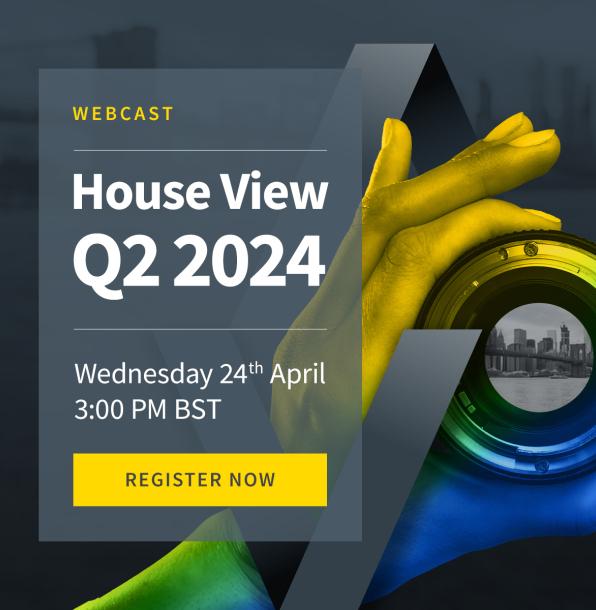
Fashion Statement newsletter Fashion This article is more than 7 months old
Naomi Campbell (centre) with designers Victor Anate and Edvin Thompson. Photograph: Evan Agostini/Invision/AP
Fri 8 Sep 2023 12.30 BST Aviva Investors 59,750 followers ! Have you registered for our House webcast yet? Join our experts on as they their thoughts on the macro outlook for quarter. Register today to make sure you miss out #HouseView #FinancialViews #Economies Learn More Advertisement
Chloe Mac Donnell
pieces for sale as part of the collection including a bodysuit (£12) and ruched mini dresses (£25). Two of the dresses were created by emerging Black designers, Victor Anate and Edvin Thompson.
PLT, which has previously collaborated with reality TV stars such as Love Island’s Molly Mae-Hague (pictured below), described its involvement with Campbell as “ground-breaking.”
Molly-Mae Hague at the launch party for her PrettyLittleThing collection in 2021. Photograph: David M Benett/Dave Benett/Getty Images for Pretty Little Thing
Campbell’s decision to actively align herself with PLT jars against a wider trend of celebrities attempting to distance themselves from mass produced brands. The popstar Olivia Rodrigo has fronted a campaign for Depop, Billie Eilish says she prefers to shop for secondhand clothes, while last week the actor Naomie Harris launched a collection of dresses made from deadstock materials with London brand Omnes.
While, Gen Z are regularly dubbed “the sustainability generation”, just like any cohort they are multifaceted. Many prefer or have little choice but to buy from fast fashion sites. In addition to being cheap, these sites are often more size-inclusive. For example, Campbell’s PLT collection runs from a UK 4 to UK 30.
However, historically fast fashion has comes not only at a cost to the environment but also to the workers making the clothes. In July 2020, the Sunday Times claimed that staff at a Leicester garment factory supplying the company were paid below minimum wage, as low as £3.50 per hour. In December 2020, the Guardian reported that Boohoo was also found to be selling clothes made by Pakistani workers who earned 29p per hour.
Campbell, who describes herself as a “changemaker”, said in an interview with W Magazine, that her main motivation to team up with PLT was the opportunity to champion emerging talent: “If I can get them on the platform, and get the light shone on them, and give them a helping hand in their career … that makes me happy.” In a subsequent interview with the Daily Mail, she said that another factor that led to the collaboration was a desire to design her own clothes.
In the magazine interview she also suggested that much of the criticism that her decision had drawn was race-related. “Do they say anything when other Caucasian models have worked with fast-fashion brands and done collaborations? They’ve said not a word. They’ve praised them. So why are they coming for me?”
Sign up to Fashion Statement
Free weekly newsletter
Style, with substance: what's really trending this week, a roundup of the best fashion journalism and your wardrobe dilemmas solved
Enter your email address
Sign up
Naomi Campbell, on the runway at her line launch. Photograph: Theo Wargo/Getty Images
But Campbell overlooks the fact that fast fashion is inherently linked to racism. Of the 74 million textile workers worldwide, 80% are women of colour. Writing in the Guardian in 2020, Kalkidan Legesse said: “The fashion industry makes huge profits from the exploitation of black and brown women. It is the millions of black and brown people making our clothes in factories thousands of miles away who bear the heaviest burden.”
Last year, the Game of Thrones actor Maisie Williams was widely criticised for joining H&M as a global sustainability advisor, while British Vogue described Kourtney Kardashian’s similar appointment at Boohoo as “another blatant attempt at greenwashing in the fashion industry”. When Hague staged a show in London last February, protestors gathered outside the venue.
The collaboration “gets right to the heart of the issue we’re facing with sustainability,” says Rachel Arthur, a sustainability consultant. “Ultimately, if you are a role model, especially one with the financial means to do things differently, it would be good to see choices made that are the most responsible ones possible.
“If it’s about bringing a platform to other emerging talent, there are also a myriad of alternatives that would achieve the same thing. The ongoing collaborations we’re seeing in the fast-fashion sector which promote hyper consumption are not going to get us there.”
To read the complete version of this newsletter – complete with this week’s trending topics in The Measure and your wardrobe dilemmas solved – subscribe to receive Fashion Statement in your inbox every Thursday.
This article was amended on 12 September 2023 to clarify that the workers allegedly being paid as little as £3.50 per hour were employed at a garment factory supplying Boohoo, not a factory run by Boohoo itself.
Sign up Privacy Notice: Newsletters may contain info about charities, online ads, and content funded by outside parties. For more information see our . We use Google reCaptcha to protect our website and the Google and apply.
Privacy Policy Privacy Policy Terms of Service
My Notes:
Fri 8 Sep 2023
Page 1
Campbell has become so synonymous with luxury fashion that her latest venture, a collaboration with the fast fashion giant PrettyLittleThing (PLT), launched on Tuesday, has left both fans and fashion insiders perplexed.
“This is honestly awful. She could have had any brand in the world. Respect is lost,”
Comment from Naomi’s fans.
“To Gen Z, this may look like a clear demonstration of an icon choosing money over meaning, and Gen Z does not tend to stand for that type of inauthentic action. It may appear as a betrayal – to Gen Z as much as it is to Naomi herself,”
Page 2
Billie Eilish says she prefers to shop for secondhand clothes
These sustainability advocating influencers are the ones that need to step in for the marketing of the rescue package.
While, Gen Z are regularly dubbed “the sustainability generation”, just like any cohort they are multifaceted. Many prefer or have little choice but to buy from fast fashion sites. In addition to being cheap, these sites are often more sizeinclusive
“If I can get them on the platform, and get the light shone on them, and give them a helping hand in their career ... that makes me happy.”
Campbells justification of the campaign.
Page 3
74 million textile workers worldwide, 80% are women of colour.
“The fashion industry makes huge profits from the exploitation of black and brown women. It is the millions of black and brown people making our clothes in factories thousands of miles away who bear the heaviest burden.”
Kourtney Kardashian’s similar appointment at Boohoo as “another blatant attempt at greenwashing in the fashion industry”
The Kardashians use private jets more than they drink water - it is essential to have advocating it girls that actually demonstrate ethical decision making in their own lives. This will then demonstrate a more meaningful and reliable story.
“Ultimately, if you are a role model, especially one with the financial means to do things differently, it would be good to see choices made that are the most responsible ones possible.

People are criticising Pretty Little Thing for contributing to fast-fashion cycle with 100 per cent off sale

‘The Pretty Little Thing 100 per cent off sale does not sit right with me at all, just promoting fast fashion on another level,’ one person tweeted
Chelsea Ritschel New York · Tuesday 30 November 2021 16:49 GMT · Comments


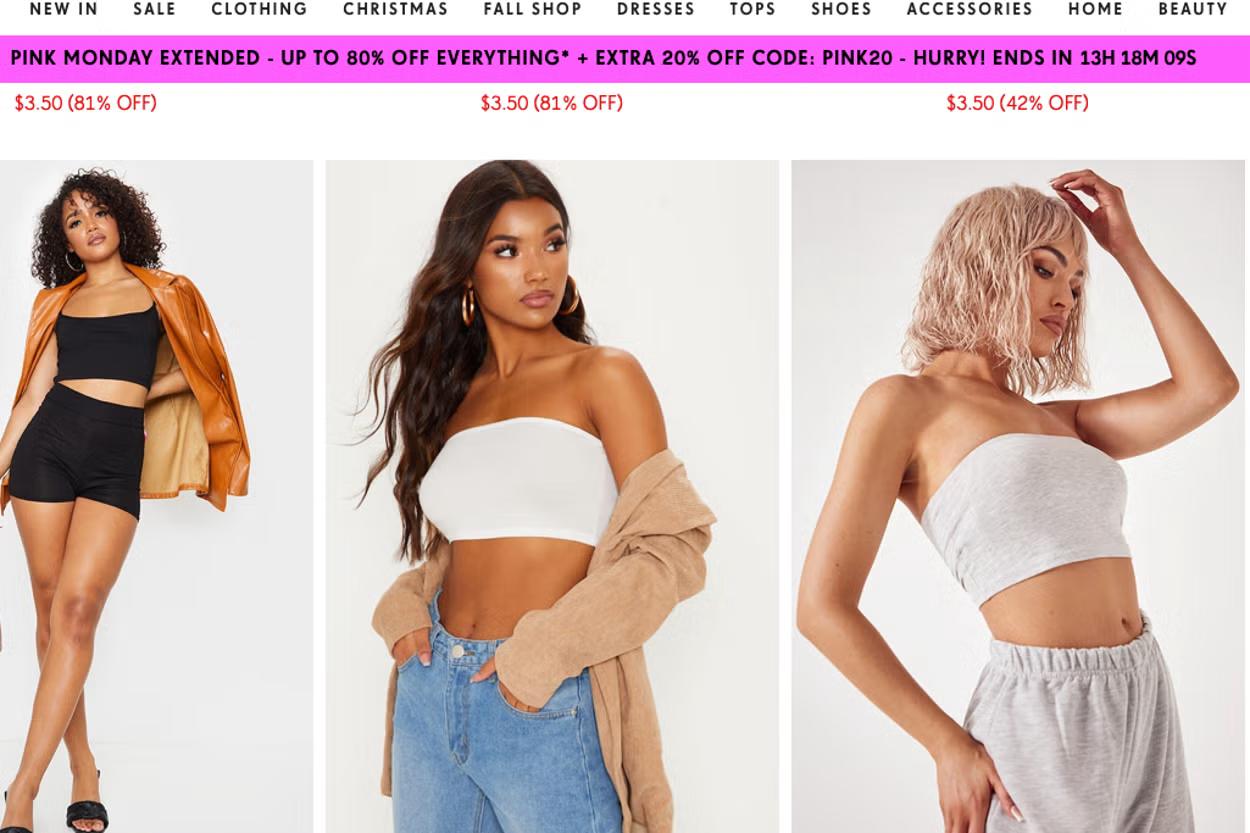
Lifestyle
are calling out Pretty Little Thing after company offers 100 per cent sale for Black Friday and Cyber Monday (PrettyLittleThing) SUBSCRIBE: £6 FOR 6 MONTHS LOG IN / REGISTER Jet2holidays Best betting sites NEWS SPORT VOICES CULTURE LIFESTYLE TRAVEL PREMIUM UK EDITION MORE
People

People are calling out online fashion retailer Pretty Little Thing for contributing to the harmful fast-fashion cycle after the site offered a 100 per cent discount on certain items on Black Friday and Cyber Monday
On Monday, the UK-based company tweeted: “100 PER CENT DISCOUNT DROP,” and urged followers to follow a link for “direct access” to the sale.
On the company’s US website, it also announced that it was celebrating the day of cyber sales with up to 80 per cent off of everything, while customers could receive an additional 20 per cent off in their carts using a promo code.
While many customers were appreciative of the deal and the opportunity to buy the retailer’s clothes at such extremely low prices, others have accused the company of promoting fast fashion and “exploiting” workers.
The negative environmental impacts of fast fashion are well-known, with the UN Environment Programme (UNEP) previously naming the fashion industry the second-biggest consumer of water and “responsible for eight-10 per cent of global carbon emissions, more than all international flights and maritime shipping combined”.
RECOMMENDED


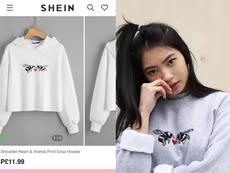
Almost half of adults don’t consider fast fashion’s environmental impact, poll suggests
Fast fashion is dying African rivers blue, report says
Shein: Fast fashion retailer accused of ‘stealing’ independent brand’s design
In addition to releasing half a million tons of synthetic microfibers into the ocean annually, according to the UNEP, fast fashion sees consumers and brands discard clothes more frequently, with the BBC reporting that the Global Fashion Agenda estimates 92 million tonnes of textile waste is created each year.



PrettyLittleThing @OfficialPLT Follow








100% DISCOUNT DROP
Shop up to 100% off lines (click this link for direct access) plt.shop/310HT6o
*Until stocks last



Most Popular Popular videos Stay ahead of the trend in fashion and beyond with our free weekly Lifestyle Edit newsletter SIGN UP Email I would like to be emailed about offers, events and updates from The Independent. Read our privacy notice
RFK Jr saps more support from Trump than Biden, new poll finds
Trump reaches deal with AG over multi-million dollar civil fraud bond
Fresh travel disruption as train drivers announce new strikes in May
Adrian Edmondson praised for ‘honest’ Rik Mayall admission
Taylor Swift nails the grief of breakups for women in their thirties
Chris Packham holds head in hands as he cringes at Matt Hancock video
Matty Healy reacts to Taylor Swift’s Tortured Poets Department album
Watch moment last runner crosses London Marathon finish line

10:00 PM Nov 29, 2021
253 Reply Share
Read 258 replies
Speaking to the BBC in 2020, Chetna Prajapati, who studies ways of making sustainable textiles at Loughborough University, said: “The current fashion system uses high volumes of non-renewable resources, including petroleum, extracted to produce clothes that are often used only for a short period of time, after which the materials are largely lost to landfill or incineration.
“This system puts pressure on valuable resources such as water, pollutes the environment and degrades ecosystems in addition to creating societal impacts on a global scale.”
On social media, many people have shared their concerns over the company’s sale, with one person tweeting: “This #BlackFriday, @OfficialPLT are literally giving away their clothes for free. What does this tell us about how they treat their garment makers? Fast fashion is costing the earth,” along with a screenshot of a shirt for sale for $0 on the site.
Promoted Links by Taboola
Plymouth: Unsold Garden Rooms Are Selling For Almost Nothing!
INSULATED GARDEN OFFICE DEALS | S
Click Here
Tiger Woods' Ex-wife is Almost 50 And Time Has Not Been Kind To Her
TOPNEWS
Empty Iceland Cruise Cabins Cost Almost Nothing
NATION
Get Offer
Escape To The Beautiful Canary Islands (See All-Inclusive Deals)
BEST SEARCHES | SEARCH ADS
Search For No Deposit Bingo | Win Big W/ No Deposit
BINGO SITES | YAHOO SEARCH
Get Offer
The Best Folding Beds for Small Spaces in 2024 - Prepare to Be Amazed!
FOLDING BEDS | SEARCH ADS
Sponsored Features



Another said: “We’ve now officially hit rock bottom. @OfficialPLT - the bottom of the barrel when it comes to fast fashion - are ‘selling’ things for £0.00 on Black Friday. How is this possible without the exploitation of

Search Now
This pale rosé wine will be be my go-to drink this spring –and it’s discounted
Find the spirit of spring in the new M&S collection
Healthy living made easy with Protein Works’ wide range of protein shakes, nutritional supplements and meal replacements
Emma Sleep knows how to welcome the warmer season
“The Pretty Little Thing 100 per cent off sale does not sit right with me at all, just promoting fast fashion on another level,” someone else tweeted.
On 26 November, Pretty Little Thing appeared to address some of the concerns about alleged exploitation of workers, with the brand claiming on Twitter that its sales are a “marketing investment” and that they don’t “in any way impact or reduce the cost price we pay to suppliers”.
“We create our offers to give our customers access to trending products, no matter what their budget,” the company said. “This offer is a marketing investment that we’ve made, and it doesn’t in any way impact or reduce the cost price we pay to suppliers.”
Despite the company’s statement, many were still critical of the brand’s choice to discount its items so steeply, with one person accusing Pretty Little Thing of being “disingenuous”.
“What this fails to mention is that by selling clothes for 99 per cent off @OfficialPLT is encouraging mass consumption and mass waste, which usually ends up rotting in landfills in the global south. To market this as widening accessibility without impact on supply chain is so disingenuous,” they tweeted.
Speaking to BuzzFeed, Venetia La Manna, a fair fashion campaigner, also shared her concerns about the sale, noting that “every single week we’re uncovering new clothing waste sites” before questioning what it says about the brand that it is willing to give away its clothes “for free”.
My Notes:
Page 1
Tuesday 30 November 2021
Despite the old date, this is something that has still occurred in recent Black Friday sale periods.
Page 2
the site offered a 100 per cent discount on certain items on Black Friday and Cyber Monday.
Shows how poorly made and how cheap the production process is.
customers were appreciative of the deal
Encourages extreme overconsumption from consumers leading to increased issues from excessive waste & increased delivery emissions.
UN Environment Programme (UNEP) previously naming the fashion industry the second-biggest consumer of water
“responsible for eight-10 per cent of global carbon emissions, more than all international flights and maritime shipping combined”.
half a million tons of synthetic microfibers into the ocean annually,
92 million tonnes of textile waste is created each year.
Page 3
“The current fashion system uses high volumes of non-renewable resources, including petroleum, extracted to produce clothes that are often used only for a short period of time, after which the materials are largely lost to landfill or incineration.
“This system puts pressure on valuable resources such as water, pollutes the environment and degrades ecosystems in addition to creating societal impacts on a global scale.”
“This #BlackFriday, @OfficialPLT are literally giving away their clothes for free. What does this tell us about how they treat their garment makers? Fast fashion is costing the earth,” along with a screenshot of a shirt for sale for $0 on the site. Page 5
“This offer is a marketing investment that we’ve made, and it doesn’t in any way impact or reduce the cost price we pay to suppliers.”
Trying to fool their consumers into believing that they are just willingly giving away money - doesn’t create a strong consumer-brand relationship.
“disingenuous”.
FASHION (HTTPS://BLOG.PRETTYLITTLETHING.COM/CATEGORY/FASHION/) BEAUTY (HTTPS://BLOG.PRETTYLITTLETHING.COM/CATEGORY/BEAUTY/)
(HTTPS://BLOG.PRETTYLITTLETHING.COM/CATEGORY/LIFESTYLE/) MUSIC (HTTPS://BLOG.PRETTYLITTLETHING.COM/CATEGORY/MUSIC/)
(https://blog.prettylittlething.com)
(HTTPS://BLOG.PRETTYLITTLETHING.COM/CATEGORY/DATING/) SHOP (HTTPS://WWW.PRETTYLITTLETHING.COM)
EASY WAYS TO BE MORE SUSTAINABLE

In celebration of World Earth Day today we are sharing our top tips and easy ways to be more sustainable.
EASY WAYS TO BE MORE SUSTAINABLE EASY TO BE SUSTAINABLE
There are many small changes you can introduce into your everyday routine that could make a big difference in the long run. From recycling your old garms, revamping your beauty must-have’s and easy habits to pick up on the daily.
ReGAIN ReGAIN
Did you know around 50 trailers of clothing go to UK landfill every day! Luckily you can do your bit to prevent the unnecessary pile up of discarded clothing. Meet the reGAIN app, turn your unwanted clothes into discounts to get cash off your next Pretty Little Thing purchase – Talk about a no brainer! Read more about how to use the ReGAIN app here (https://www.prettylittlething.com/regain)
| 04 | 2021
SHARE
22
BACK TO ALL POSTS

(https://www.prettylittlething.com/regain)
Switch It Off Switch It Off
From time spent in the shower to how long your heating is on, these are easy ways to be more sustainable on a daily basis.
Next time you’re showering try to cut it down slightly, additionally you could even invest in a water-saving showerhead.
Instead of putting on the heating straight away could you layer up with an oversized jumper
(https://www.prettylittlething.com/clothing/knitwear/jumpers.html) ?
Trial out purchasing recycled toilet paper instead of your usual, most even have plastic-free packaging.
Anything electrical such as chargers or your TV, ensure to turn off and unplug when not in use.

Recycle and Reuse Recycle and Reuse
Recycle as much as you can, wherever you can! From plastic bottles to cardboard there are specific recycling bins for them all.
Why not try putting up a no junk mail sign on your letterbox to limit the amount of paper waste.
Switch to a reusable cup
(https://www.prettylittlething.ie/prettylittlethingpink-plastic-tumbler.html) for your morning coffee order.
When it comes to water bottles opt for a re-fillable bottle
(https://www.prettylittlething.ie/prettylittlethingsmoke-glass-water-bottle.html) instead.
Why not carry reusable cutlery and straws in your bag so you’re never caught off guard?
Don’t use plastic bags at checkout! Instead, take your own reusable bags
(https://www.prettylittlething.ie/accessories/bags/shopperstotes.html?navigation-accessories-shoppertote)
If returning a product by post, reuse the original packaging it came in.

Easy Yet Effective Easy Yet Effective
Ditch the paper work. Opt for digital letters, bank balances, shopping receipts etc.
Use your phone, tablet or computer to take your work notes. Take the stairs over the lift. This also doubles up as a leg workout – you’re welcome.
Use public transport where possible. Could you try going meat-free one day a week or as often as you feel comfortable?
Try out growing plants, veg etc. either at home or even on your work desk. Start composting where possible (trial out a kitchen top food waste bin as a super easy starting point).
Beauty Beauty
Opt for greener beauty by swapping your go-to products to ones a little more environmentally friendly. Shampoo bars are a perfect example of this along with reusable cotton pads! You can read more about greener beauty
(https://blog.prettylittlething.com/opt-for-greenbeauty-with-garnier/)
Re-wear and Take Care Re-wear and Take Care
Up-cycle your clothing or re-wear each item as much as possible. We’re thinking one top, three ways kinda vibe – Chic yet efficient. Washing your denim items inside out will allow them to last longer. Try out steaming certain items rather than ironing. Refresh your whites by soaking them in warm water and lemon juice. Wash your garments on a lower temperature to reduce CO2 emissions.
Prefer to shop recycled fabrics? Be sure to check out Recycled by PLT here (https://www.prettylittlething.ie/shopby/recycled.html?navigation-pltranges-recycled) & for even more ways to do your bit for the environment head to the PLT sustainability edit
(https://www.prettylittlething.com/sustainability) onsite.
(HTTPS://BLOG.PRETTYLITTLETHING.COM/HOWTOSTYLETHESQUAREPREVIOUS (HTTPS://BLOG.PRETTYLITTLETHING.COM/HOWTOSTYLETHESQUARENECKTREND/) (HTTPS://BLOG.PRETTYLITTLETHING.COM/SEENONPLTINFLUENCERS138/) NEXT (HTTPS://BLOG.PRETTYLITTLETHING.COM/SEENONPLTINFLUENCERS138/)
in this blog post
BACK TO ALL POSTS (/)
My Notes:
In celebration of World Earth Day today we are sharing our top tips and easy ways to be more sustainable.
Greenwashing technique to fool consumers into believing that they take sustainability issues seriously, however PLT isn’t actually practising what it preaches.
Did you know around 50 trailers of clothing go to UK landfill every day!
Largely from their extreme quantities of available products. Effective say to educate their consumers, however, they as a brand are the ones that should be doing more to alleviate this. Page 2
recycled toilet paper
They don’t even use recycled materials?
plastic-free packaging.
As a shopper of the brand I KNOW their parcel packaging is made from plastic. Page 3
Could you try going meat-free one day a week or as often as you feel comfortable?
Suggesting that their consumers go meat free, but they frequently use animal materials and provide no evidence towards THEIR actions in regards to the welfare of animals.
Opt for greener beauty by swapping your go-to products to ones a little more environmentally friendly.
Their beauty products aren’t cruelty free ???
Page 4
re-wear each item as much as possible.
Page 1
22 | 04 | 2021
Most PLT products are unable to withstand more than a couple of wears - cheaply made in the fast fashion business model.
Fast fashion enters the resale game, but don’t call it sustainability
Shein, Zara and Pretty Little Thing have all launched resale. While there is potential to shift consumer behaviour, experts say without degrowth, it’s closer to greenwashing.
By Bella Webb
October 27, 2022
Make better business decisions
Sign up to our newsletter for a truly global perspective on the fashion industry
Photo: Pretty Little Thing
To become a Vogue Business Member and receive the Sustainability Edit newsletter, click here.
In the last three months, fast fashion brands Pretty Little Thing (PLT), Shein and Zara have launched resale platforms in an attempt to tap into the circular economy. While resale as part of a circular business model can be a sustainable alternative to buying new, experts are not convinced fast fashion is up to the task.
One of the key tensions is how companies communicate resale to consumers, and messaging is mixed. Zara says Zara Pre-Owned, a peer-to-peer platform that launches on 3 November in the UK, is a way for consumers to make “more sustainable decisions” and for the company to move towards a “more sustainable model”. It says it
won’t be using the platform to promote new products to customers, and that repairs and donation options will also be available. PLT, meanwhile, says it hopes to educate its customers to make “better choices” and make resale “more attractive” via its Marketplace app, which has been downloaded more than 200,000 times since launching in August, but says it “has not and will not be making any sustainable claims”. Shein said it doesn’t expect to make a profit from Shein Exchange, which launched earlier this month, and “wants to provide a destination for Shein customers to become active participants in circularity and find new closets for their pre-loved products”.
“When you lead people to believe that a product can be recycled or have a second life — as is the case of these resale platforms
— people end up consuming the primary good even more, because it is seen as a purchase with no consequences,” says Maxine Bédat, author and the director of the nonprofit New Standard Institute.
Part of Shein’s motivation in launching resale is to attempt to take control of secondhand transactions. A company statement issued at the time of launch in October said: “leadership acknowledges that resale threatens to cannibalise the sale of new items.” Secondhand sites do have the potential to cannibalise new product purchases, which is why resale is considered a sustainable shopping choice: secondhand fashion marketplace Depop says nine out of 10 purchases made on its app prevent the purchase of a brand-new item elsewhere.
The resale market is now worth an estimated $100-120 billion, three times more than in 2019, according to the latest resale report from Vestiaire Collective and Boston Consulting Group (BCG). The sector is expected to grow a further 127 per cent by 2026, per the 2022 Thredup Resale Report. As mainstream consumers have become
more comfortable with secondhand fashion, and the stigma around resale has started to shift into aspiration, many brands and retailers have launched integrated resale platforms, from Isabel Marant and Balenciaga to Selfridges and Net-a-Porter. The idea is to build loyalty among sustainability-minded consumers, offer lower-priced options for new customer acquisition, and continue profiting from products long after they leave the shopfloor.
Resale has been held up as an easy win for sustainability, but recent findings challenge the assumption that all resale is good. The latest report from The RealReal showed consumers using it as a replacement for fast fashion: buying and selling secondhand at high speeds, and switching the source without reducing the amount of items they churn through. Fast fashion brands entering the market has raised further concerns among sustainability experts, who say brands shouldn’t use resale to make sustainability claims unless they are also working towards a degrowth model, which requires reducing output and new consumption.
“If they’re launching a resale platform without reducing their overall output, that’s a red flag,” says model and sustainable fashion influencer Brett Staniland, who regularly takes to social media to challenge brand claims.
It might be better, but don’t say it’s sustainable
Maria Chenoweth, CEO of charity shop chain and textile waste charity Traid, has been working in charity retail for upwards of 30 years, and says the quality of clothing entering the secondhand market has deteriorated significantly in that time, largely due to the advent of fast fashion. She says “ultra fast fashion” has exaggerated the problem. “There is so much disposable clothing now, which is
designed to be worn once or twice,” Chenoweth says. “If these brands really believed in resale, they would improve the quality of their clothing. Otherwise, it’s just greenwashing.”
In response to greenwashing criticisms, Zara did not comment directly but said it aims to extend the life of garments through repair and donations as well as resale. PLT said in a statement that it’s a misconception that customers shop the site every week, stating that on average, customers purchase 4.6 items a year. “The entire fashion industry, not just fast fashion, has an impact on the environment. Fast fashion is an easy target and inaccurate figures are often thrown around with ease,” PLT said. Shein said the Exchange platform promotes the environmental benefits of purchasing pre-owned clothing over new items.
Legislation around sustainable fashion, meanwhile, is gaining pace, and a series of investigations by international watchdogs have made greenwashing a primary concern. In June, the Norwegian Consumer Authority called out the Higg Index — the industry’s leading sustainability assessment tool — for providing misleading data to fashion brands. Then, the UK’s Competition and Markets Authority (CMA) called out Boohoo, Asos and Asda for potential greenwashing. Resale platforms are at risk too. “Businesses must ensure any claims they make about the environmental benefits of resale are clear, genuine and backed up by evidence,” says Cecilia Parker Aranha, director of consumer protection at the CMA. “Our investigation into the fashion sector is ongoing. If we suspect that a business has broken the law by misleading customers over its green credentials, we will take action.”
Added to that is the EU strategy for sustainable and circular textiles, introduced in April, which proposed a series of measures to regulate fashion between now and 2030, covering not only
production and consumption, but also the destruction of products. This could be a significant part of fast fashion’s motivation for introducing resale, says Professor Susan Scafidi, founder and director of the Fashion Law Institute at New York’s Fordham Law School. In response to this, Shein and PLT said that the resale launches were motivated by consumer demand. Zara declined to comment on whether legislation had played a part.
Resale is only one part of the equation
There are other changes fast fashion brands need to make alongside introducing resale, starting with making clothes more compatible with circular systems. “Fast fashion is designed for a weekly or even daily trend cycle, and people don’t want those designs once the trends pass,” says Staniland. While charity shops and other secondhand platforms might not be so overwhelmed with fast fashion items now that those items can be resold on fast fashion sites, those items will still exist, and the potential for them to end up in landfills or secondhand markets in the Global South remains.
In response to criticisms about its environmental impact, Shein says: “Shein Exchange is just one of several moves our company is making to help address the ongoing issues of textile waste and build a future of fashion that is more circular. In addition to the launch of Shein Exchange, this year Shein became a signatory of World Circular Textiles Day, joined the Canopy initiative and launched an Extended Producer Responsibility (EPR) Fund.”
These moves have had a mixed response among experts. The same day Shein Exchange launched, a documentary called Untold: Inside the Shein Machine, available on UK TV network Channel 4, claimed that workers in Guangzhou factories producing for Shein were paid as little as 3p per garment, with deductions taken for mistakes made
during up to 18 hour shifts. Experts say resale can’t override the exploitation and overconsumption in Shein’s business model.
As well as reselling secondhand Zara items, customers on Zara Pre-Owned will be able to access repair services and donate clothing from other brands to the Red Cross.
Photo: Zara
If brands are serious about resale, they should build it into a broader circular fashion system, which also includes repair and potentially rental, says Staniland. Zara’s resale platform also includes repair, which sets it apart from Shein and PLT. “The idea that Zara clothing is cheap is a myth,” he says, pointing out that women’s outerwear ranges from £4.49 to £143.49 on Shein and £3 to £105 on PLT, while the same category on Zara spans from £49.99 to £579. “Zara is fast but it’s not cheap. If I spend that much on something, I want to be able to get it repaired, and I’m more likely to do that.”
Shifting consumer behaviour
Secondhand platforms don’t tend to discriminate against fast fashion items that end up on their sites, following the base logic that secondhand purchases are better than primary purchases, no matter how the garments were produced. European resale app Vinted says there is plenty of demand for secondhand fast fashion items, and extending the life of any garment should be taken as a win. “This has the potential to reduce the need to produce new garments, and at the same time, reduce the environmental pollution and pressure on people in supply chains to keep producing more at lower cost,” says Vinted’s consumer lead Natacha Blanchard.
“Fast fashion unfortunately produces billions of garments every year, so inevitably you will find it on Depop as it is reflective of the wider market,” adds Depop head of sustainability Justine Porterie. “Our aim is to convert as many people as possible to secondhand, and for
some, the entry point is fast fashion.”
This has been the case for plus-size consumers, who often find that the lack of plus-size clothing options in the primary market trickles down to resale. Alongside the recent collaboration between US resale platform The RealReal and luxury plus-size fashion retailer 11 Honoré, fast fashion brands entering resale may help with this, as they often have broader size ranges.
Advocates admit that while it’s not a straightforward sustainability win, there are some benefits to fast fashion taking on resale. Making secondhand shopping a more common practice among customers is a start.
“These brands might be able to normalise secondhand quicker than other players have managed to,” says Traid’s Chenoweth. “Hopefully, once resale has been normalised, people will realise how abnormal ultra fast fashion clothes are.”
Comments, questions or feedback? Email us at feedback@voguebusiness.com.
More from this author:
Beyond sustainability: How Sana Jardin’s fragrance sales are powering its social impact
Zalando enters the adaptive fashion race
Could modular fashion make sustainability fun?
My Notes:
Fast fashion enters the resale game
Page 1
Previous attempts to enter the resale market - my collaboration needs to offer a solution that is different to what has previously been done.
October 27, 2022
resale as part of a circular business model can be a sustainable key tensions is how companies communicate resale
Effective communication needs to be a target for my rescue plan. Consumers need to WANT the garments even after they have been previously owned - desirability.
“better choices”
“more attractive”
200,000
Apps are highly popular with Generation Z. Page 3
Resale has been held up as an easy win for sustainability
The RealReal showed consumers using it as a replacement for fast fashion: buying and selling secondhand at high speeds, and switching the source without reducing the amount of items they churn through
If product quantities are limited, then the number of available garments that can resurface will also be limited - this will help to reduce the high speeds.
brands shouldn’t use resale to make sustainability claims unless they are also working towards a degrowth model, which requires reducing output and new consumption.
“If they’re launching a resale platform without reducing their overall output, that’s a red flag,”
The collaboration sub brand needs to consist of limited quantities.
Page 2
“There is so much disposable clothing now, which is
Page 4
designed to be worn once or twice,” Chenoweth says. “If these brands really believed in resale, they would improve the quality of their clothing. Otherwise, it’s just greenwashing.”
Extension from page 3.
extend the life of garments through repair and donations as well as resale investigations by international watchdogs have made greenwashing a primary concern
“Businesses must ensure any claims they make about the environmental benefits of resale are clear, genuine and backed up by evidence,” says Cecilia Parker Aranha, director of consumer protection at the CMA.
Page 5
Resale is only one part of the equation
making clothes more compatible with circular systems
“Fast fashion is designed for a weekly or even daily trend cycle, and people don’t want those designs once the trends pass,”
T shirts for collaboration need to be collectibles that consumers will want in the future too - one drop a year that is accustomed to represent what has happened during that time period?
items will still exist, and the potential for them to end up in landfills or secondhand markets in the Global South remains.
Page 6
If brands are serious about resale, they should build it into a broader circular fashion system, which also includes repair and potentially rental
Zara is fast but it’s not cheap
Following the luxury mentality of Zara, PLT should increase quality and ultimately price.
“This has the potential to reduce the need to produce new garments, and at the same time, reduce the environmental pollution and pressure on people in supply chains to keep producing more at lower cost,”
secondhand shopping a more common practice among customers
Page 7



Say goodbye to foot discomfort and hello to blissful relief! Hranan Shoes READ MORE Ad FAST FASHION’S SUSTAINABILITY DRIVE IS A SHAM Share a7M Next up: The Hackney tenants revolting ...
Wednesday 16 February, 2022
Text by Frances Leach
Pretty little liars — Fashion behemoth PrettyLittleThing’s plan to launch a resale marketplace is nothing but a ploy to make consumers buy more, writes Frances Leach.
Today, PrettyLittleThing (PLT), the fast-fashion etailer owned by Boohoo, announced it was moving into the resale market by launching an online marketplace for shoppers to sell their old PLT clothing. ADVERTISING
Share
Photography by '@mollymaehague via Twitter



people that produce and work on our garments don’t work day-in day-out on these pieces for them to be throwaway fashion […] We want people to love these garments and wear them constantly.”


rst thing about PLT’s business model, this statement comes as news. While Hague has been heralded for attempting to elevate the brand and move [it] away from throwaway, to timeless fashion,” it’s worth no stranger to greenwashing. This latest announcement from Hague serves as yet another desperate attempt to combat a never-ending slew of bad press surrounding the brand’s horrendous record of corporate supply chain abuses in sweatshops, such as workers in Leicester being paid less than minimum wage to produce their garments in terrible conditions.

Not found
Fast fashion is not built to survive resale; it breaks apart and goes out of style so quickly that it is a minimal shelf life. This corporate spin, a ploy to encourage consumers to buy more mass produced clothing and feel a little less guilty about it.
https://t.co/zFlU2gOF7o
—
Frances Leach (@francesleach_)
February 16, 2022
Fast fashion is not built to last. It’s made from cheap synthetic fbres, which are produced from fnite fossil fuels – mostly oil and gas. Sweatshops aren’t places where careers are made, they are where low paid
workers go through hell and back every day just to make the latest trends for pennies a piece. Hague’s claim that PLT “encourages sustainability” is totally at odds with a brand that once came under fre for selling items for as little as 8p during their Black Friday Sale. PLT is, rather, a bastion of our age of hyper-consumption where collections are no longer seasonal, and consumers can demand and purchase new trends in an instant. This is something called “micro-seasons” and there’s now about 50 to 100 of them a year.
Instagram is fooded with pictures of infuencers who are paid to promote micro-seasonal clothes to their followers. But they’re selling a lie. These infuencers wear the items for less than an hour before they’re chucked onto resale sites with the caption ‘

In 2019, Missguided’s £1 bikini was widely criticised as a fagrant example of how warped the industry has become. A £1 bikini is never going to last, or ft
properly, so it’s no surprise when products just like this end up in a landfll or charity shop. According to a report called Fossil Fashion by Changing Markets, between 2000 and 2014, clothing production doubled, with the average consumer buying 60 per cent more clothing compared to 15 years ago. Each item of clothing is now kept for half as long. Some estimates suggest that consumers treat the lowestpriced garments as nearly disposable, discarding them after just seven or eight wears. The rise of disposable fast-fashion models comes with a devastating cost. Current purchasing practices by brands force suppliers to cut corners on labour rights and environmental protection if they are to successfully fulfl their orders. It can be deadly, as shown by the horrifc Rana Plaza collapse in Bangladesh. And, it can be costly, as evidenced by the fashion industry’s $16 billion debt to garment workers in 2020 and the mountains of discarded clothing pouring into landflls at a rate of one bin lorry per second.
The issue of sustainability has become too urgent to ignore. And if consumers start to worry about the byproducts of a successful fast-fashion brand, chiefy textile waste, then there has to be a guilt-free way for them to buy more. PLT’s resale marketplace is a cynical attempt to alleviate some of that guilt. But resale is not a solution, it’s merely a sticking plaster for an industry problem that runs much deeper than PLT. The business model of fast fashion, and the wider fashion industry, is to make, buy and sell as much as possible. By ofering to provide a place for consumers to sell old clothing, the brand is simply helping their customers clear their wardrobes for more new PLT products.
For young consumers, sustainability is key – and savvy brands know that. Depop, the resale platform
that dominates second hand fashion, is made up overwhelming of younger users, with 90 per cent being under the age of 26. There are currently more than 150,000 search results for PLT and more than 120,000 for PrettyLittleThing on Depop. It’s a smart business move, then, for PLT to cut out the middleman and seek to emulate a similar operation to Depop by ofering conscious-minded shoppers a place to resell their clothes. But equally, it’s not hard for consumers to see that PLT’s attempt to appear sustainable (and take out a big rival) is nothing without a genuine commitment to ethical and green fashion. The impact of the “spend to prove your power” mentality on mainstream consumerism has resulted in faster fashion, cheaper products, and a total disregard for the environment and human rights. What’s clear is that no amount of recycled PLT bodycons is going to change that.
Follow Frances Leach on Follow Frances Leach on Twitter Twitter..
Enjoyed this article? Like Enjoyed this article? Like Huck Huck on on Facebook Facebook or or follow us on follow us on Twitter. Twitter.
THIS ARTICLE HAS BEEN TAGGED
FAST FASHION FRANCES LEACH
ACTIVISM OPINION
SUSTAINABILITY
My Notes:
Page 2
Wednesday 16 February, 2022
Pretty little liars — Fashion behemoth PrettyLittleThing’s plan to launch a resale marketplace is nothing but a ploy to make consumers buy more, writes Frances Leach.
online marketplace for shoppers to sell their old PLT clothing.
Page 3
PLT is no stranger to greenwashing.
desperate attempt to combat a never-ending slew of bad press surrounding the brand’s horrendous record of corporate supply chain abuses in sweatshops, such as workers in Leicester being paid less than minimum wage to produce their garments in terrible conditions.
Fast fashion is not built to survive resale
minimal shelf life
Fast fashion is not built to last. It’s made from cheap synthetic fibres, which are produced from finite fossil fuels – mostly oil and gas.
Page 4
“micro-seasons” and there’s now about 50 to 100 of them a year.
This model needs to be broken down for PLT.
But they’re selling a lie. These influencers wear the items for less than an hour before they’re chucked onto resale sites with the caption ‘worn once for promo’.
A £1 bikini is never going to last, or fit
Page 5
properly, so it’s no surprise when products just like this end up in a landfill or charity shop
2000 and 2014, clothing production doubled, 60 per cent more clothing compared to 15 years ago
clothing is now kept for half as long
consumers treat the lowest- priced garments as nearly disposable, discarding them after just seven or eight wears.
Rarely even this many when brought from PLT.
Current purchasing practices by brands force suppliers to cut corners on labour rights and environmental protection if they are to successfully fulfil their orders
And if consumers start to worry about the by- products of a successful fastfashion brand, chiefly textile waste, then there has to be a guilt-free way for them to buy more. PLT’s resale marketplace is a cynical attempt to alleviate some of that guilt.
the brand is simply helping their customers clear their wardrobes for more new PLT products. Page 6
90 per cent being under the age of 26.
Depop customers - do they care about sustainability or do they just have a limited disposable income.
150,000 search results for PLT and more than 120,000 for PrettyLittleThing on Depop.
PLT’s attempt to appear sustainable (and take out a big rival) is nothing without a genuine commitment to ethical and green fashion.
“spend to prove your power” mentality on mainstream consumerism




A sustainable lifestyle. One day at a time.
The Wellness Feed launched as a lifestyle and news publication devoted to the wellness and ecofriendly scene. Created by a journalist TWF answers readers’ questions about living sustainably with educational and call-to-action articles.
Protesters Call Out Pretty Little Thing For Greenwashing
THE WELLNESS FEED STAFF - FASHION - FEBRUARY 27, 2022 461 POSTS
Is Pretty Little Thing Sustainable?

Is Pretty Little Thing Sustainable?
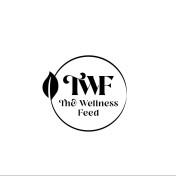
THE
FEED STAFF L L L
ondon fashion week is abuzz with energy from backstage and stylish attendees. And, in the case of Pretty Little Thing, activists. During the fast fashion brand’s late night show, another catwalk showcased protestors sharing their concerns about accusations of poverty wages and fast fashion’s environmental impact. The protest was led by the founder of the Instagram account @OhSoEthical and campaigner Venetia La Manna who gave a speech about the how the billion-dollar fashion brand is negatively impacting both the environment and the workers across its supply chain.
WELLNESS
Venetia also led her own Twitter protest calling out the brand for ‘not caring about the people who make their clothes or the planet.’ And, judging by the brand’s recent controversies around workers’ wages and misguided campaigns around sustainable collections, her statement doesn’t seem too far from the truth.
'Conspiracy of silence' around slave-like con…
“Boohoo CEO net worth: £1.42 billion. Leicester garment maker: £3.50 per hour”
One of the signs protesters held up at the fashion show drew a comparison between the wage of Boohoo Group ( Pretty Little Thing’s parent company) CEO and the wages of garments workers at a Leicester factory. After founding Boohoo in 2006, Mahmud Kamani’s net worth is estimated to be around just over $1 billion. It’s a far cry from the poverty wages that garment workers are said to be paid at several factories making the brand’s clothing and textiles.
In 2017 Channel 4 went undercover to show that hundreds of British-based factory workers were paid less than half the legal minimum wage. Some workers were earning less than $5 an hour. In response to the undercover documentary, Boohoo released a statement that they were unaware of the investigation
733 VIEWS 7 MINS
0 COMMENTS
and would not tolerate workers being paid less than minimum wage
Despite the 2017 investigation, more unethical labor allegations followed in 2019. An independent report from the workers’ rights group Labor Behind the Label published an independent study showing that factories in Leicester were putting workers at risk of catching COVID-19 and were not given protective gear. Again the brand released a statement that unfair treatment of workers would not be tolerated.
In 2020 the The Sunday Times ran an investigation that found that garments workers at one of the brand’s factories were paid as little as $4.69 an hour. The undercover reporter worked at the factory for two days earning less than $11.69 an hour ( Britain’s minimum wage).
In response to the damaging investigations, Boohoo Group began the production of a new factory in Leicester. The 23,000 square foot space is designated as the brand’s first and to-date only Boohoo-owned manufacturing site. The designated factory is said to allow the group to actively take a part in ensuring that labor standards are met such as guaranteed 40-hour contracts, 33 days of paid leave, medical care and free shares in the group. However, it’s


Are Boohoo Factories Sustainable & Ethical?
In 2021 Boohoo launched an Agenda for Change. But, is it just greenwashing?


TheWellnessFeed
Categories
The Real Real Everlane
United by Blue
Drunk Elephant Ecostore
Links
Category Index
About | The Wellness Feed
Contact | The Wellness Feed | Privacy Policy
AxiomThemes © {{Y}}. All Rights Reserved.
Greenwashing Fast Fashion


Similar to other fast fashion brands, Pretty Little Thing has made a series of statements and commitments to be sustainable. Yet, similar to these other brands, these claims have come under fire for being vague or misleading. For instance, despite many brands
having ‘conscious’ or ‘green’ collections, a recent study has shown that up to 80% of products sold by these fast fashion brands are made from virgin-plastic. This holds true for shoppers seeking to shop at Pretty Little Thing for pieces made with more sustainable materials under its ‘Ready For The Future’ label. Most of the items in this curated section are made from only a percentage of recycled fibers. That still means that 50% of a garment’s material can be virgin plastic-based polyester, which is the dominate material used throughout the brand’s collections. Without that clear distinction a customer might not instantly realize that they are still purchasing plastic-based fast fashion and contributing to the plastic problem in the fashion industry.
Pretty Little Thing has also released its sustainable goals for 2025 and 2030. But, without clear targets like GOTS organic cotton certifications or partnerships with organizations like the Leather Working Group, it’s unclear exactly how the brand will ensure that these goals are met and valid.
100% recycled polyester and cotton by 2025. More sustainably sourced organic cotton by 2025.
100% animal welfare standards for leather, wool, feather and down products.
100% sustainably sourced materials by 2030.
The fashion industry might be on trend with terms like ethical and sustainable, but aside from clean-looking marketing pictorials and vague claims to work with more sustainable materials, most fast fashion brands fall short when it comes to specifying their sustainable initiatives and goals. Pretty Little Thing still showcases products with prices so low that they raise questions about workers’ salaries and the supply chain. During Black Friday prices were said to be as low as $0.55. To date, sale pieces from their sustainable collections are still within the single digits with prices as low as $4.80. These cheap prices are the effect of cheap labor and cheap materials, not sustainable materials like organic cotton or living wages. So, despite the fast fashion brand’s claims, it appears that Pretty Little Thing isn’t on track to be an ethical or sus-
My Notes:
FEBRUARY 27, 2022
Page 1
Page 2
poverty wages and fast fashion’s environ- mental impact.
the billion-dollar fashion brand is negatively impacting both the environment and the workers across its supply chain.
Page 3
‘not caring about the people who make their clothes or the plan- et.’
Page 4
factories in Leicester were putting workers at risk of catching COVID-19 and were not given protective gear.
garments workers at one of the brand’s factories were paid as lit- tle as $4.69 an hour
Page 5
Pretty Little Thing has made a series of statements and commitments to be sustainable.
vague or misleading.
Page 6
‘conscious’ or ‘green’ collections, a recent study has shown that up to 80% of products sold by these fast fashion brands are made from virgin-plastic
Any sustainability claims need to be thoroughly backed up & sustainable production materials need to be declared.
‘Ready For The Future’ label. Most of the items in this curated section are made from only a percent- age of recycled fibers
50% of a garment’s material can be virgin plastic-based polyester,
a customer might not instantly realize that they are still purchasing plasticbased fast fashion and contribut- ing to the plastic problem in the fashion
industry.
GOTS organic cotton certifications or partnerships with organizations like the Leather Working Group,
Suggestions for how the sub brand can operate?
fashion brands fall short when it comes to specifying their sustain- able initiatives and goals
During Black Friday prices were said to be as low as $0.55 sale pieces from their sus- tainable collections are still within the single digits with prices as low as $4.80.
cheap prices are the effect of cheap labor and cheap materials, not sustainable materials like organic cotton or living wages
























 BY SOPHIE HIRSH
BY SOPHIE HIRSH


























 Love Island star Indiyah Polack is the face of PrettyLittleThing's new marketplace
Newsbeat
Love Island star Indiyah Polack is the face of PrettyLittleThing's new marketplace
Newsbeat
















































